

100 Comprehensive Travel Keywords During Your Keyword Research?

SEO is the biggest driver of organic traffic to your website. When you use the right keywords in your content, you can get greater online visibility.
Understanding the best Keyword for travel is essential in creating successful and effective travel blog posts.
Although the travel industry is a competitive space, with basic SEO knowledge and keyword research, you can set your website up to attract more visitors.
However, with so many other tasks involved in running a travel blog, finding the time for keyword research can be challenging.
This leads to the question: when should you do keyword research? This blog post will discuss the best timing for keyword research, how it can benefit your travel blog, and the best keywords for a travel blog.
So, if you’re a travel blogger looking to improve your SEO game, keep reading to learn more about the importance of keyword research for travel bloggers.
the Importance of having the best Travel Keywords
Keyword research plays a crucial role in the success of travel blogging. It is a vital tool for understanding what people are searching for in relation to your travel niche and allows you to create content that is not only informative and engaging but also optimized for search engines.
Incorporating relevant travel keywords into your blog posts increases the chances of your content being discovered, more organic traffic, and, ultimately, increased page views.
One of the critical benefits of keyword research for travel bloggers is the ability to tap into the mindset of your audience.
You can tailor your content to address their needs, preferences, and interests by understanding the specific search terms they are using.
This helps you to create more relevant and targeted blog posts that resonate with your readers, making them more likely to stay on your site, engage with your content, and even convert into loyal followers.
Another important aspect of travel keyword research is its impact on search engine optimization (SEO).
By incorporating keywords into your blog posts, you signal to Google what your content is about, helping them to index and rank your site more accurately.
This increases the likelihood of your blog appearing higher in Google search results (SERPs), making it more visible and driving organic traffic to your site.
Overall, keyword research is a fundamental aspect of travel blogging that should not be overlooked.
By dedicating time and effort to keyword research , you can ensure that your blog effectively reaches and engages with your intended audience, helping you grow your blog and achieve your blogging goals.

Optimal Times to Conduct Travel Keyword Research
To maximize the effectiveness of your keyword research for travel blogs, it’s essential to consider the optimal times to conduct keyword research.
While keyword research can be done at any time, specific periods can provide better results and help you stay ahead of the competition.
One of the best times to conduct keyword research is during the initial stages of planning your blog post.
By identifying relevant keywords early on, you can ensure that your future blog posts are strategically optimized from the start.
This allows you to align your content creation process with the keywords most likely to drive organic traffic to your site.
Another opportune time to research keywords for travel is when you’re brainstorming new blog post ideas.
By conducting keyword research during this phase, you can uncover popular search terms related to your travel niche and use them as inspiration for your content.
This ensures your blog posts are interesting, informative, and highly relevant to those Googling-specific travel keyphrases.
In addition, it’s beneficial to revisit and update your keyword research periodically.
Trends and search behaviors can change over time, so by regularly conducting keyword research, you can stay up-to-date with the latest keywords that resonate with your audience.
This will help you consistently optimize your blog content and maintain its visibility in search engine results.
By strategically timing your keyword research, you can ensure that your travel blog stays relevant, attracts more readers, and continues to grow in popularity.
Strategies to Effectively Implement Keywords for Travel
To effectively carry out keyword research for your travel blog, here are some strategies to consider:
1. Use keyword research tools
There are various keyword research tools available that can help you identify relevant and popular keywords for your travel niche.
These tools provide insights into search volume, competition, and related keywords, allowing you to make informed decisions about which keywords to target.
2. Analyze your competition
Take a look at what keywords your competitors are ranking for. This can give you valuable insights into which keywords are driving traffic to their blogs and help you identify any gaps or opportunities that you can capitalize on.
3. Focus on long-tail keywords
Long-tail keywords are longer, more specific keyword phrases that often have lower search volume but higher intent.
By targeting long-tail keywords, you can attract a more targeted audience and increase your chances of ranking higher in search engine results.
4. Consider user intent
When conducting keyword research, it’s important to consider the intent behind the search query. Are users looking for information, inspiration, or to book a trip?
By understanding the intent, you can tailor your content to meet their needs and increase the chances of converting them into readers or customers.
5. Monitor and track keyword performance
Once you have incorporated keywords into your blog posts, monitoring their performance is important.
Use analytics tools to track the organic traffic, engagement, and conversions generated by specific keywords.
This will help you identify which keywords are bringing the most value to your blog and make adjustments as needed.
By implementing these strategies, you can effectively carry out keyword research for your travel blog and improve its visibility, attract more readers, and achieve your blogging goals.
Remember, keyword research is an ongoing process, so it’s essential to regularly review and update your keywords to stay ahead of the competition.
- Use the target or main keyword within the first 100 words of your page.
- Don’t add an outgoing link with your keyword ad anchor text.
- Aim to use each keyword two times naturally.

Tips for Incorporating Keywords into Your Travel Blog Posts
In order to effectively incorporate keywords into your travel blog posts, consider the following tips:
1. Utilize keywords naturally
While it’s essential to include your chosen keywords throughout your content, it’s crucial to do so in a natural and organic way.
Avoid keyword stuffing or forcing keywords into your writing. Instead, focus on creating high-quality, informative content that naturally incorporates your keywords.
2. Include keywords in your title and headings
One of the most impactful places to include keywords is in your blog post titles and headings. This not only helps search engines understand the relevance of your content but also catches the attention of readers searching for specific terms.
3. Optimize your meta tags
Meta tags, including your meta title and meta description, play a significant role in search engine optimization. Incorporate your target keywords into these tags to improve your blog post’s visibility in search engine results.
4. Create unique and engaging content
While incorporating keywords is important, it’s equally crucial to create unique and engaging content that appeals to your audience.
Your blog posts should provide valuable information and insight into your travel niche, encouraging readers to stay on your site and explore more of your content.
5. Don’t forget about image optimization
Images can also contribute to your blog’s visibility in search engine results. Optimize your image alt text and file names with relevant keywords to increase the chances of your images being discovered.
How To Pinpoint Your Ideal Travel Keywords
When identifying travel keywords for your web content, there are three points to think about:
- Search Volume : The number of times users search a keyword in a month. The higher the search volume, the more web traffic you can get from the keyword.
- Difficulty : Generally speaking, keywords with a higher search volume and commercial intent are more challenging to rank for. And if you’re competing against loads of high-authority websites for a specific keyword, it will also be more challenging to rank for.
- Search inten t: When people enter keywords into the search bar, does the content in the results give them the information they are looking for? Offer the information that the person wants, and the keywords will bring you relevant traffic, not just a lot of traffic.
High-Volume Travel Keywords
Below you will find a list of some of the most popular keywords in the travel niche along with their global monthly search volume on Google.
If your website or business focuses on travel, these keywords can be helpful for content ideas and increasing your SEO presence.
Remember, keyword research is an ongoing process, so regularly revisit and update your keywords to stay ahead of the competition and ensure continued success.
Final Thoughts
While these are pretty general keywords, they do at least provide a base from which you can brainstorm ideas for your travel business.
Because travel is a hot topic online, the competition on the SERPs is pretty high. Taking a data-informed approach to optimizing your content will better position your website for ranking.
Remember, ranking content on search engines is not a quick fix and doesn’t happen overnight. So, it’s a good idea to include other types of marketing in your overall strategy to grow your travel business.
Learn how to do keyword research with Me
You’ve learned the basics about how to do keyword research, but if you’re looking to take your keyword research skills to the next level, I am here to help to schedule a SEO Strategy Call today
One Comment
- Pingback: Stay22 is the Best Hotel Affiliate Program for 2024!
Leave a Reply Cancel reply
Your email address will not be published. Required fields are marked *
Save my name, email, and website in this browser for the next time I comment.
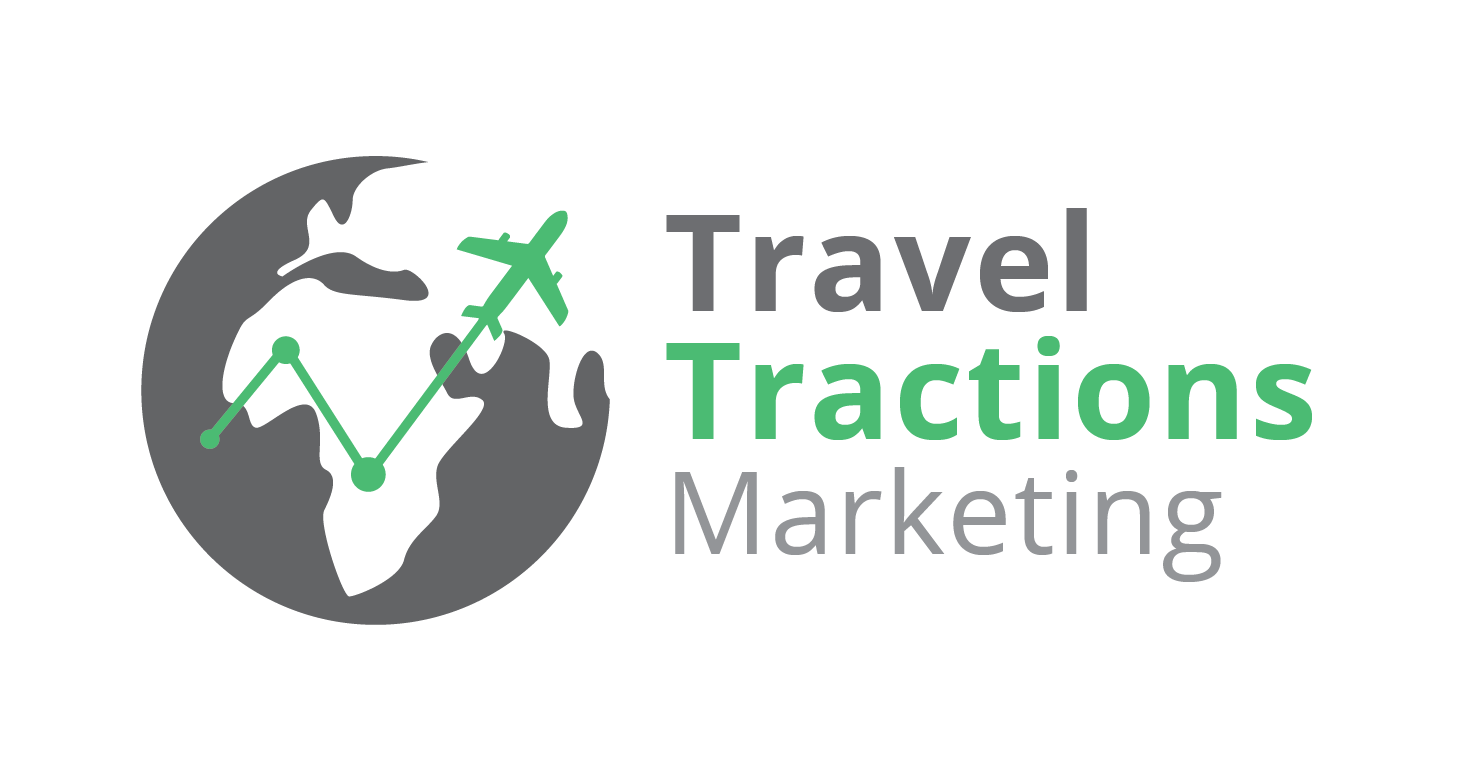
Finding Travel Keywords: A Top SEO Skill for Travel Bloggers
In order to be successful online, you need to have the right keywords. In this blog post, we will go over six places where you can find good travel keywords to boost your SEO strategy.
You’ll learn how this practice differs from regular search engine optimisation (SEO) and why nailing this is important when working on a website related to travelling.
Many travel agents and bloggers often overlook keywords, causing the wrong targeting and wasted money and time. So if you want your site or article on the first page of Google for relevant searches, then read this post!
Tip: Need help with your travel keywords? Check out our SEO keyword services .
What Are Travel SEO Keywords?
SEO keywords are the words, phrases, or queries people enter using search engines. These are essential components in any SEO strategy for a travel website or blog , as it gives you an idea of what to base your content around.
For example: If your target audience is searching “where to stay in Hawaii” and you decide to target this keyword, then you should ensure that your content adequately meets the intent of this query.
Types of SEO Travel Keywords
There are two main types of keywords in SEO—namely, broad and long tail. A broad search might be “hotels in Hawaii”. These can be challenging to rank for as they are generally taken up by various booking sites on the Search Engine Results Page (shown below).
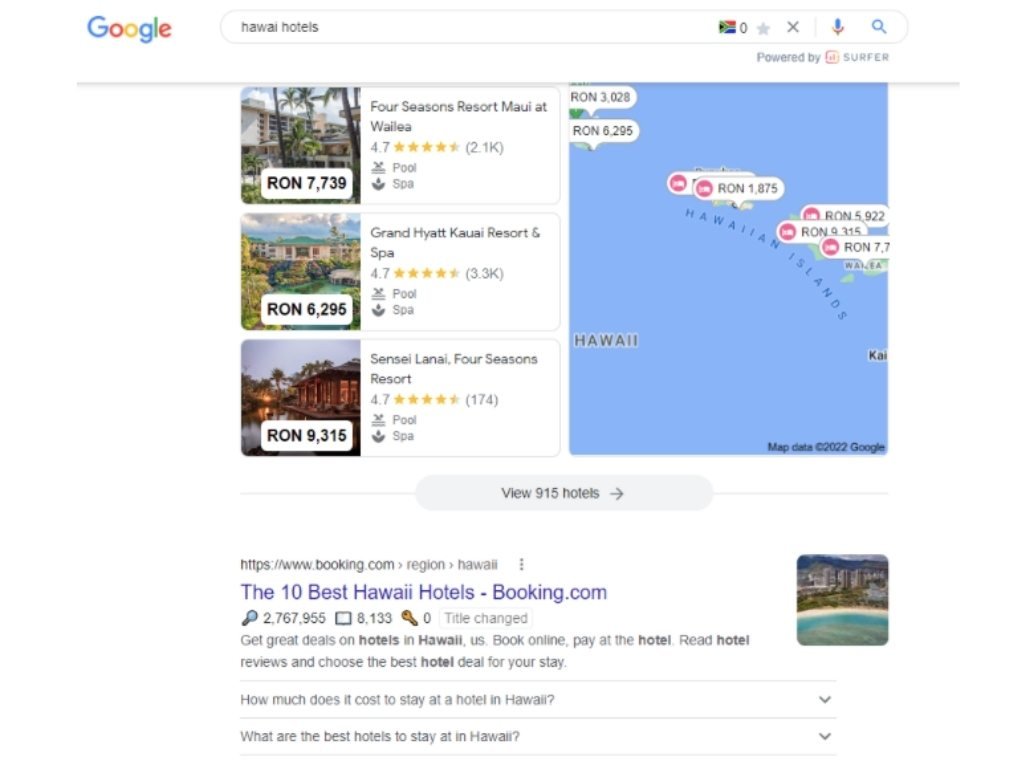
Long tail keywords are more specific. These tend to include more modifiers and are easier to rank for. An example would be “all-inclusive beach hotels in Honolulu Hawaii”. This is especially powerful given the high volume of content and competition within the travel industry.
The Benefits of a Powerful Keyword Funnel Strategy
A keyword funnel strategy allows you to identify and categorise your content based on popular search terms by users. While you may always have your own keywords that you focus on, here are some of the benefits of implementing a keyword funnel for your site.
It Provides Structure for Your Site
The most notable benefit has to be how it can help structure your website. Having your broad short-tail keywords as pillar posts or category pages allows you to create a web-like structure from which your content flows.
A great example of this is a travel agency focusing on tour packages. If your site offers content on world travel and isn’t site-specific, then creating category or niche pages on each major country is a fantastic start.
From there, you can include city or attraction-specific tours that target the highest-volume and easy-to-rank keywords for that specific region. This web-like structure also allows your niche audience to easily navigate the site, offering them the best possible user experience.
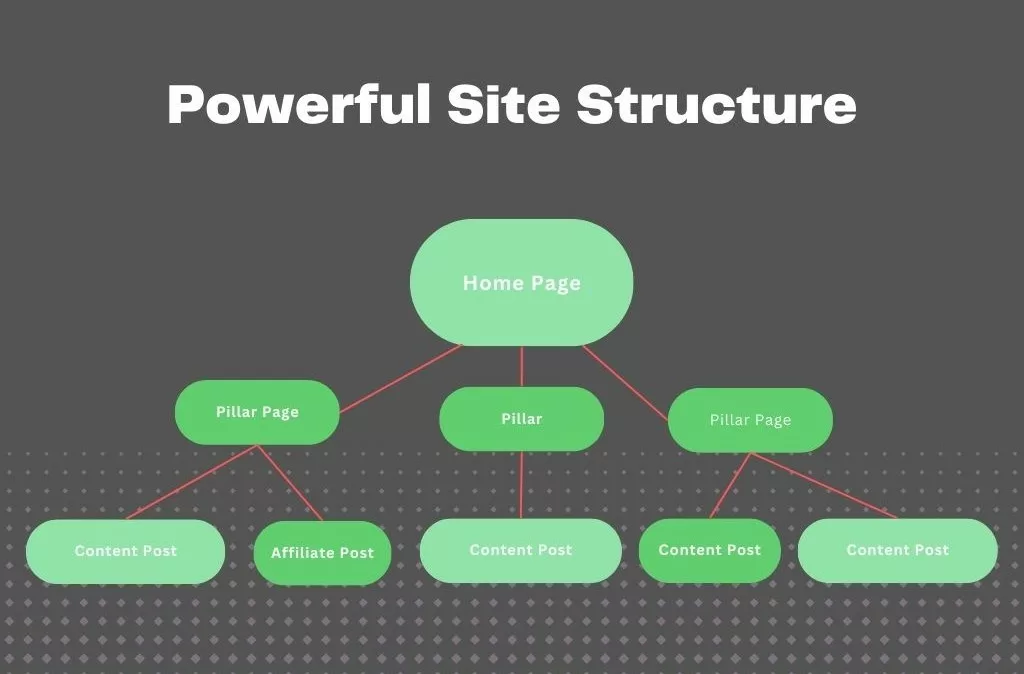
Helps you Identify High Volume Keywords Related to Your Niche
The other benefit of a keyword funnel strategy is it allows you to target high-volume, easy-to-rank for keywords. How is this the case?
Consider you’re looking for keywords for blogs on travel, and you’ve already extensively covered the topic “Tropical vacations”. You have covered all the possible destinations under this niche, but that doesn’t mean you’ve answered all the top search queries for the topic.
For example, your audience may want to know about the “Cheapest all-inclusive vacations in the Seychelles” or the “Best cruise tour operators in Bali.” These could be easy-to-rank, high-traffic keywords you haven’t covered under the broad keyword “Tropical vacations.”
With the right marketing strategy and website structure, your site can start crushing the competition.
Tip: If you’re looking to improve your SEO, have a look at our content marketing strategy services .
The Different Types of Searched Travel Keywords to Consider
You now know the difference between broad and long-tail keywords, but we can go another step further. When a search engine user types a keyword into the search bar, they are looking for something specific.

Informational Intent
Informational intent includes users looking to broaden their knowledge on a particular topic. The content you provide for these keywords will need to answer the reader’s search query and ideally offer further reading material to potential money-making pages.
This is where a systematic approach to the content is crucial. You don’t want to draw in potential clients but have a high bounce rate because you’re not answering the user’s query.
Having high-quality content on your site that provides valuable information develops a level of trustworthiness for the user. This can help encourage them to continue exploring your site and potentially lead them to money-making pages.
A great example might be “Best time to visit South Africa”. This informative post can internally link to money-making posts such as “Best hotels in Cape Town”.
Navigational Intent
These are keywords that usually draw traffic directly to your site. In most cases, users with a navigational intent have developed a level of trust with the site and have become regular visitors.

Commercial Intent
If you’re looking to provide valuable information but also want to monopolise money-making potential, this search intent is best to target. Travel companies and regular bloggers love to target this user intent, and it’s usually beneficial for the reader and themselves.
More often than not, these users are just browsing potential products or wanting to further their knowledge before making a purchase.
A great example of this might be “Best boat cruises in Cape Town”. You can easily provide beneficial information for the reader and offer bookable tours for the topic.
Transactional Intent
This refers to the target keywords that users enter with the intention of purchasing something. Although this intent is fairly similar to commercial intent, however, the user already knows they would like to make a transaction.

How to Use SEO Keywords for Travel and Tourism?
SEO keywords need to be strategically placed within a title, meta description, and content. These are three of the most important elements displayed in the SERPs, so optimising this is essential for your travel website or blog.
Incorporating Keywords for Travel Blogs Into Titles
The page title is important as it tells users and search engines what your website or posts are about. For this reason, you should ensure that your page title is SEO-friendly to both people and bots.
For an SEO-friendly page title, keep the following in mind:
- Humans decide whether or not they should click, so make sure your page title is catchy and enticing.
- Ensure your target keyword appears in your page title, preferably near the beginning.
- Keep your page title between 50 and 60 characters, or 580 px long.
- Try not to include the target keyword in the title more than once. This can be seen as keyword stuffing.
- Include strong modifiers in your page title. These are words that will help your page rank for related search terms. In the image above, a strong modifier is “cities”, which can help the post rank for a query like “best cities to live in South Africa”.

Adding Your Target Keyword to the Meta Description
The meta description, along with the page title and URL, appears in the SERPs as a snippet. As such, optimising this can greatly influence your click-through rate.
Here are some tips for an SEO-friendly meta description:
- Include the target keyword or synonyms in the meta description.
- Add your target keyword. Ideally, try to have it within the first sentence of the meta description.
- Your meta description should be between 50 and 160 characters, or 400 px to 920 px in length. Search engines generally cut off anything past this length, and if it is shorter than 50 characters or 400 px, it’s highly likely it won’t be included.
- Ensure that it includes catchy travel words — you could pose a question or call to action to draw in the audience.
Making the URL User and SEO-Friendly
The URL of your web page is also essential for ensuring your travel content is seen. A relevant URL will help search engines categorise your content and thus increase its likelihood of ranking in SERPs.
To optimise this, follow these steps:
- Your URL should contain your target keyword, as this tells users and search engines what the page is about.
- Ensure that your URL is short, clear, and easy to understand — avoid additional words, symbols, special characters, or numbers.
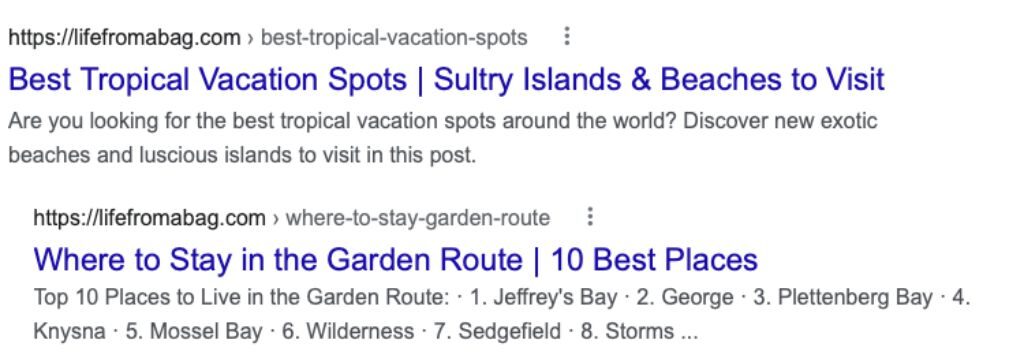
The image above shows an optimised snippet (the top snippet). The target keyword (best tropical vacation spots) appears in the URL, meta description, and page title. Additionally, both the page title and meta description are catchy and an ideal length.
Adding Keywords Related to Travel Into Text
Based on your keyword research, you will want to include various keywords throughout your content. These should relate to your topic or main keyword. For example, if you’re writing on hotels in Hawaii on the beach, you’ll likely find plenty of other keywords similar to this that will also help you rank.
In the following section, we will highlight some ways that you can find strong topics and keywords for your travel blog or website.
How to Find the Top Travel Keywords for SEO
The first place to find good travel SEO keywords is through your own expertise. If you’re an expert and know about specific destinations, then use that knowledge by writing articles based on where you’ve been or things in the industry that interest you.

To take it a step further, ensure that the search term you’re targeting is actually being searched for. There are several keyword research tools you can use to help with this. Popular picks include Ahrefs , Google Search Console , SEO Surfer , and Ubersuggest .
These tools will provide you with a wide range of practical insights to validate targeting a given keyword. Some valuable data provided include the amount of traction a keyword receives each month (pertaining to traffic and volume), whether or not the keyword will be easy to rank for, and plenty more.
By considering these insights, you will be able to create content that best aligns with your target audience’s intent.
Social media platforms like Pinterest, Instagram, Facebook, and Twitter can also provide you with a number of useful insights. These platforms are particularly helpful for understanding your target audience and the queries they’re after.
Below is a detailed guide on how to leverage each of these tools to find strong keywords and opportunities for your travel site or blog.
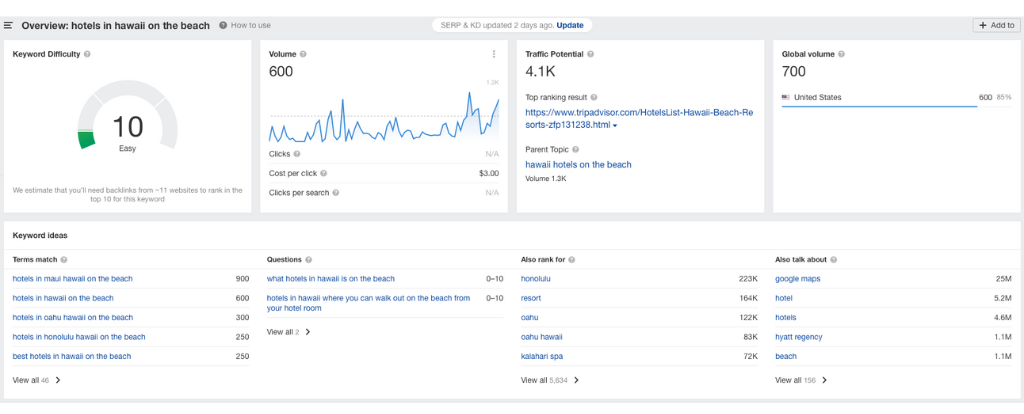
By leveraging Ahrefs data, many marketers and SEOs have been able to achieve higher Google rankings. To make things even better, the Ahrefs blog is also an open source of tips and tricks to help you maximise the Ahrefs tools.
Note: Ahrefs is a premium tool, but it has some great features for finding more traffic. So, if SEO is your thing, then we would highly recommend taking the time and signing up for this monthly service.
2. Google Search
If you’re not looking to pay a monthly subscription fee, then do not worry — there are plenty of ways to find strong keywords and topics without spending a cent.
One of the most powerful tools is Google. You can type the query you wish to target into the search engine and see what comes up in the SERPs. It also helps to look at the “people also ask” section, as this includes additional information that users may be looking for based on their initial query.
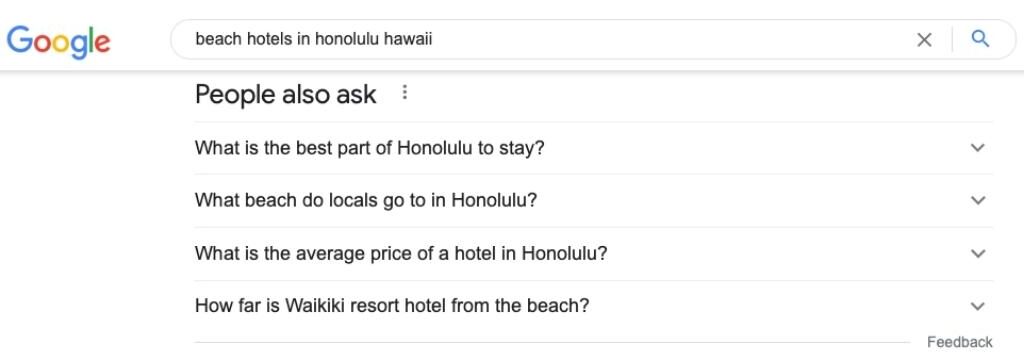
3. Google Search Console
Aside from the Google Search function, you can also use Google Search Console (GSC). This is a free tool, but it’s beneficial to use the Adwords tool, which will be at an additional cost.
GSC helps you perform your keyword research and identify possible search campaigns. Like Ahrefs, this will provide you with estimates on how many searches a keyword is getting. Another great feature is it allows you to see which keywords you are already receiving clicks and impressions from, which can help you decide if optimising a certain page is necessary.
As GSC is primarily targeted at those running Google Ads, you can also expect additional information, like the estimated cost of targeting a given keyword.
Tip: This is an extremely beneficial tool for content optimisation. If you want to upgrade your content, look at our on-page optimisation services .
3. Social Media
Another free tool that is often overlooked when researching the best keywords for travel websites is social media. While it is not necessarily a keyword research tool, it is an excellent source for finding medium and long-tail keywords receiving high traffic volumes.

Social media platforms are constantly gathering information on people — including what they do, what they like, where they go, and what might prompt them to click. And given that the average user spends nearly three hours a day on these platforms, you can expect some good, reliable data.
Various social media platforms can be leveraged in different ways. Here is a brief look at how to use each for keyword research:
- Instagram: You can make use of hashtags to identify relevant topics. For example, if you want to post travel content, search #travel and see what other hashtags recent posts are using.
- Facebook: Use Facebook targeting options to learn about your audience or search travel-related Facebook groups for popular topics.
- Twitter: Use Twitter’s Explore function and see what topics appear under “trending” and “for you”. This will highlight various topics that people in your industry are talking about.
- Pinterest: This app predicts what content users interact with and provides related content. By searching for travel, you’re sure to find plenty of topics through pins, boards, and hashtags.
- YouTube: Use the auto-complete function to find related terms. This can be done using Google and Pinterest too. You can also check out the various travel YouTube tags.
Note that some social media platforms like Twitter will require you to be more active to reap the rewards. And if you’re looking to run a social media campaign of your own, check out our social media marketing services .
4. Keysearch
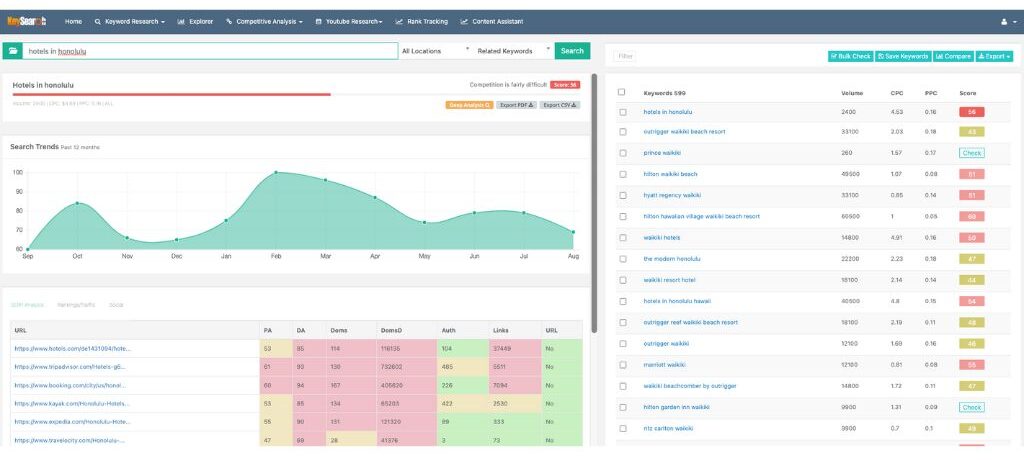
The free version of this tool will give you some basic information, but the paid version of Keysearch ($12/month) has more features and really helps with all your SEO campaigns.
It’s not too expensive, considering the detailed insights you can receive, so we would recommend signing up for the paid version.
5. Ubersuggest
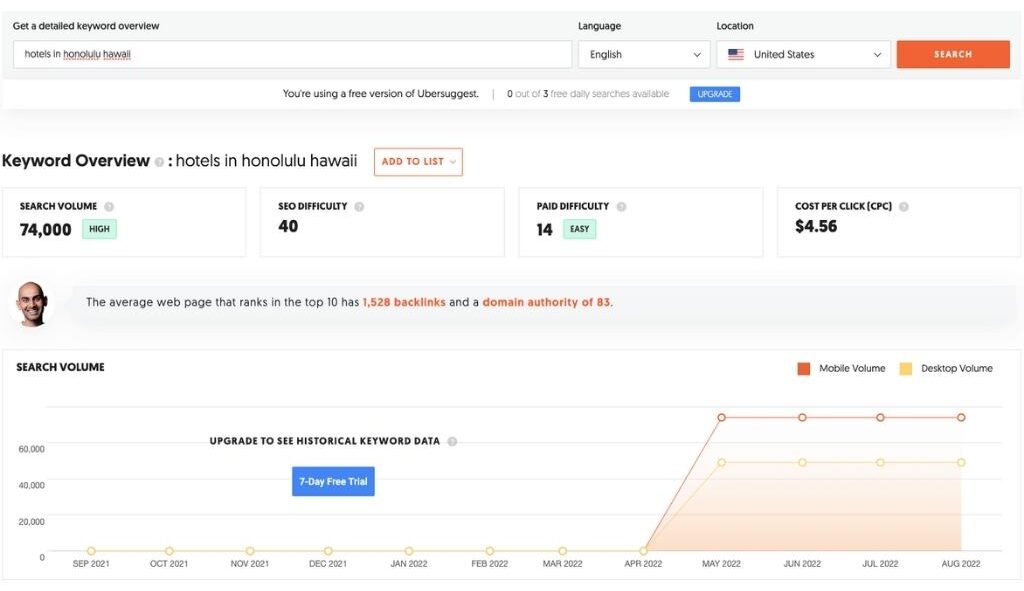
Ubersuggest is a free Chrome extension that provides you with a variety of insights, including keywords, monthly search volume, cost per click, and competition data. Simply enter the keyword or phrase you’re after, and it will bring up all the most popular pages for that term.
It’s also not limited to keywords specific to Google, but sites like Amazon and YouTube, too. As such, you can expect to find a variety of topics and long-tail travel keyword lists using this free tool.
6. SEO Surfer Chrome Extension
Like Ahrefs, Surfer SEO provides us with keywords to be used in our content. It takes the main keyword you enter, scans the web for competitors who are already ranking for that main keyword, and combines the keywords those competitors are using.
You will be able to see these keywords on the SEO Surfer site or by using the SEO Surfer Chrome extension . This will show you your keyword usage on the page you’re writing on and the keywords you should try to add.
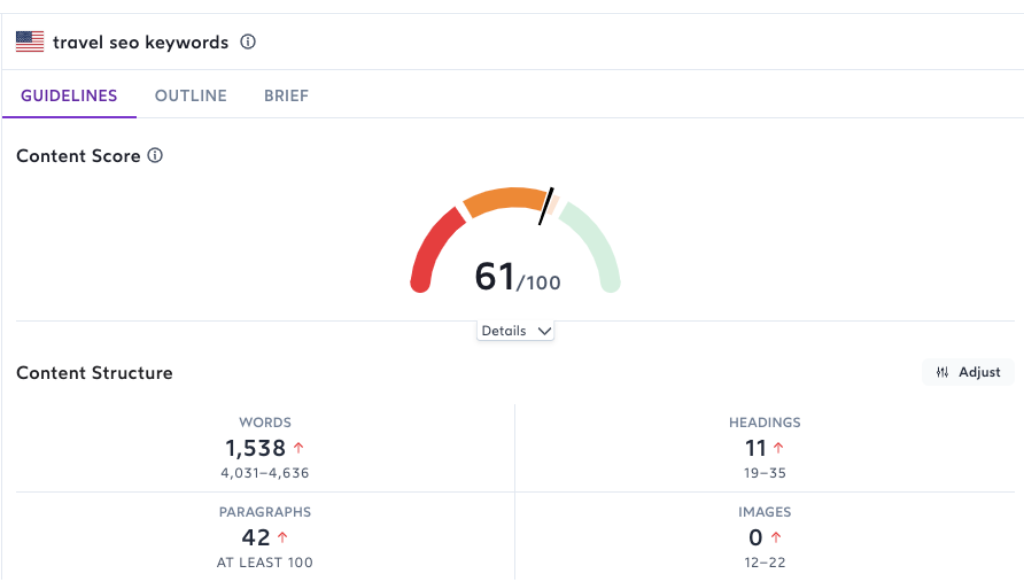
In addition to words and phrases, Surfer SEO provides several other metrics to help you write and optimise your content. These include the average word count that the post should be, how many headings the post should have, what keywords to include in those headings, and more.
A Quick Note on Modifiers
Keywords are a powerful aspect of any travel site’s SEO, but tracking the modifiers is also important. These strings of words and phrases are regularly added to the initial target keyword by search engine users.
Incorporating these popular modifiers throughout your content can play a significant role in helping you rank in SERPs. Keep in mind these should still be added naturally.
The Negative Effects of Keyword Stuffing
Keyword stuffing is seen as a technique in which one tries to manipulate and improve their search rankings by overusing keywords and phrases within their content. While this was a powerful strategy of the past, it forms part of the list of Google penalties your site can endure.
There is no formula to avoid keyword stuffing. But the best practice is keeping your content user-friendly and only naturally incorporating keywords where possible.
Our Processes for Finding the Best Keywords for Travel Bloggers
If you sign up for one of our travel SEO services , you may want some assistance finding related keywords to your travel niche. These processes require an analytical approach to identify already written content and find the best possible options for future content.
Here’s a basic breakdown of each process and the key differences between them.
1. Topic Mine
A topic mine helps you identify easy-to-rank keywords that can bring in the highest possible traffic to your site. It entails having an already established broad keyword such as “France itinerary”. Keep in mind there may be related keywords that could help you find more topics to write about.
An example, if the target keyword is “France itinerary”, you may want to add “France travel” or “France Holiday” to your search.
Once we have the main topics, we use the Ahrefs content explorer tool to find high-traffic, easy-to-rank keywords about this topic. We then systematically identify the best topics to write on and prioritise them within a formatted sheet.
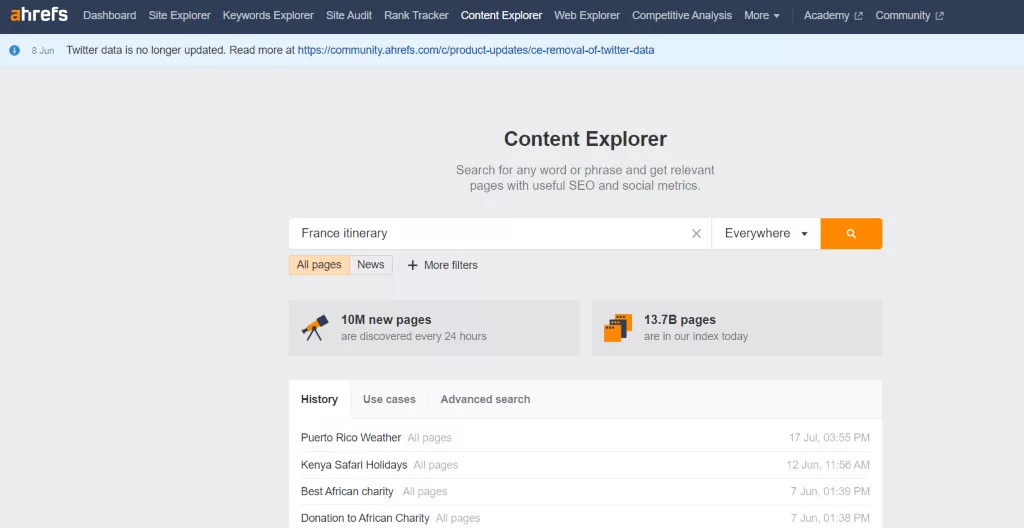
2. Phrase Match Mine
A phrase match mine is fairly similar to a topic mine. Usually, there is a predetermined series you will want to write about, such as “Luxury hotels in X” or “Best places to visit in Y”.
Using the Ahrefs phrase match tool, we are able to find all the best keywords matching the given phrases. This process helps you identify keywords that your site is most likely to rank for within a particular series.
This way, you are not wasting time and money writing high-difficulty topics.
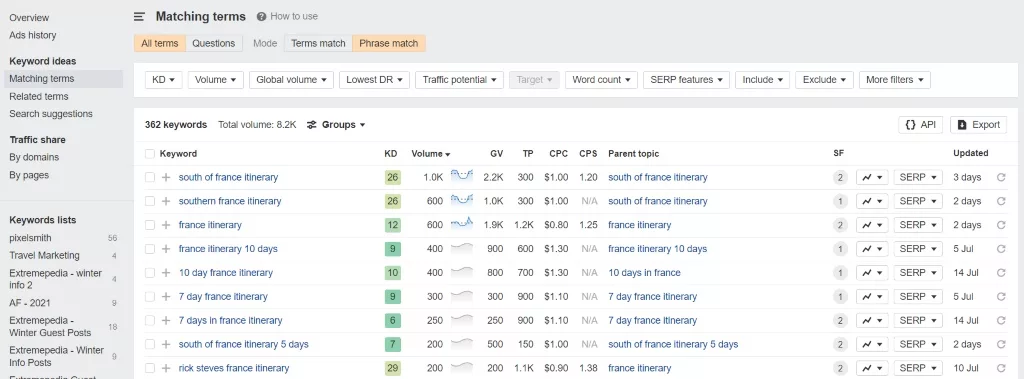
3. Competitor Mine
Our last and possibly most popular process is the competitor mine. As the name suggests, this is a process in which you find all the high-traffic, easy-to-rank posts that your competitors are ranking for.
We usually ask for your top three competitors or perform a quick site search on Ahrefs to identify your top competitors. We then identify and compare these three competitor sites and find the best topics your site can rank for.
What Are the Best Travel Keywords for the Travel Industry?
You no longer need to wonder what are the best keywords for travel websites. From knowing the different types of keywords to the plethora of tools mentioned in this guide, your SEO campaigns are about to hit new heights.
Whether you use Ahrefs, SEO Surfer, Google, or social media, you’re sure to find some of the most searched queries within the travel space.
So what are you waiting for? Begin with effective keyword research to find high-traffic topics and keywords relating to various destinations, activities, and attractions, and start growing your travel blog!
What’s the next step? Book a marketing consultation session with us and start figuring out how your website can reach all the right people.

More to explorer

SEO Vocabulary | 75+ Words You Should Know

The Importance of Authoritative Content for SEO in 2024

ChatGPT vs Jasper AI | The Pros & Cons of Each AI Writing Tool
Book a call with an digital strategist.
How to Search for SEO Keywords for Travel and Tourism

At a time when remote working and digital nomadism are the order of the day, the travel and tourism industry is expected to show new heights of growth in the coming years. But to get a sizable piece of that cake, you must know how to curate a top travel keywords list for your content strategy.
Building your content strategy around travel SEO keywords has several benefits:
- It makes your content appealing to search engines
- It guarantees that you’re solving actual problems for people
- It helps attract your target audience
Within the next few minutes, I will describe several easy-to-use automation tools for finding the best-performing travel keywords and boosting the SEO visibility of your tourism website.
In this step-by-step guide , you’ll learn:
- How to find top-notch travel SEO keywords for meta tags
- How to curate a travel-related keywords list for your site pages
- How to find SEO keywords for travel blog posts
- How to select the MOST SEARCHED travel keywords on Google
By the end of this guide, you’ll have a database of travel agency keywords to use in your SEO strategy that looks like this:
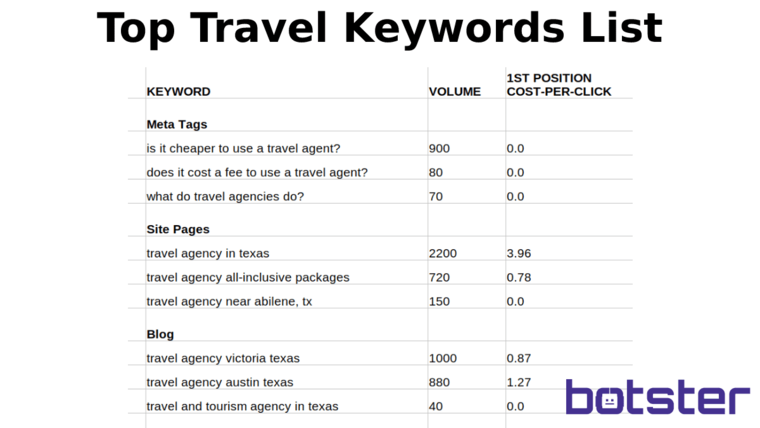
Without further ado, let’s get started!
Where to FIND travel keywords for SEO
Finding top-notch travel seo keywords for meta tags.
What are meta titles and meta descriptions?
Meta titles and descriptions are elements that summarize the content of a web page. They are displayed in the search engine results pages (SERPs) and help users decide whether to click on a link or not.
Here's a breakdown of each:
Meta title:
- This is a concise, descriptive title displayed as the clickable headline for your page in search engine results pages (SERPs). The best SEO travel keywords to use in titles are often problem-solving.
- It should be no longer than 70 characters to avoid truncation by search engines. Keep it short and straightforward.
- SEO keywords for travel relevant to your page's content should be included, as they can help search engines understand what your page is about and potentially improve your ranking for those keywords.
- Think of it as a mini-ad for your page. Aim to accurately summarize its content and entice users to click.
Meta description:
- This is a brief summary of your page's content, typically displayed beneath the title in SERPs.
- It should be around 155-160 characters to ensure full display.
- A compelling meta description can significantly impact your click-through rate (CTR) by telling users what they can expect to see on your page and highlighting its value proposition.
- Include some target keywords for travel websites, but prioritize clarity and entice users to click.
Why is it important to enrich meta tags with travel-related keywords?
If you enrich meta titles and descriptions with travel-related keywords, they can help search engines decide that your page is a good resource to display to searchers, thereby increasing your web traffic.
The first automation tool I’ll be introducing in this guide is the Meta Tags Extractor . This tool can help export meta tags and other important SEO parameters from competitors’ websites.
To gain access to the Meta Tags Extractor , you must first create a FREE Botster account :

Once your account is registered, follow the steps below to export travel keywords for SEO using the Meta Tags Extractor :
- Launch the Meta Tags Extractor by clicking on “Start bot”:

- Give the job a name to make it unique and specify a folder. (I’ll name mine “Texas travel keywords list” ):
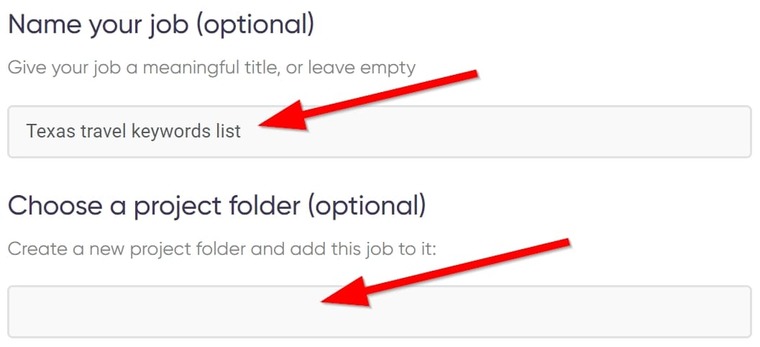
- In the field titled “Your data”, paste the websites of other travel agencies in your location to find top travel keywords in their meta tags.
💡 Life hack : You can find competitor websites using the Google Local Business Finder .
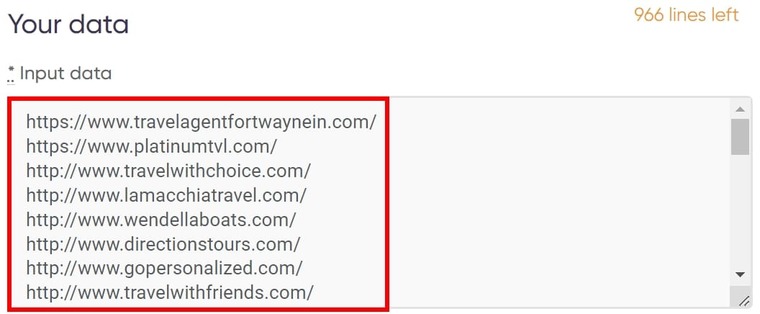
- Set up your notification options, making sure you tick “Attach results to the notification email”:
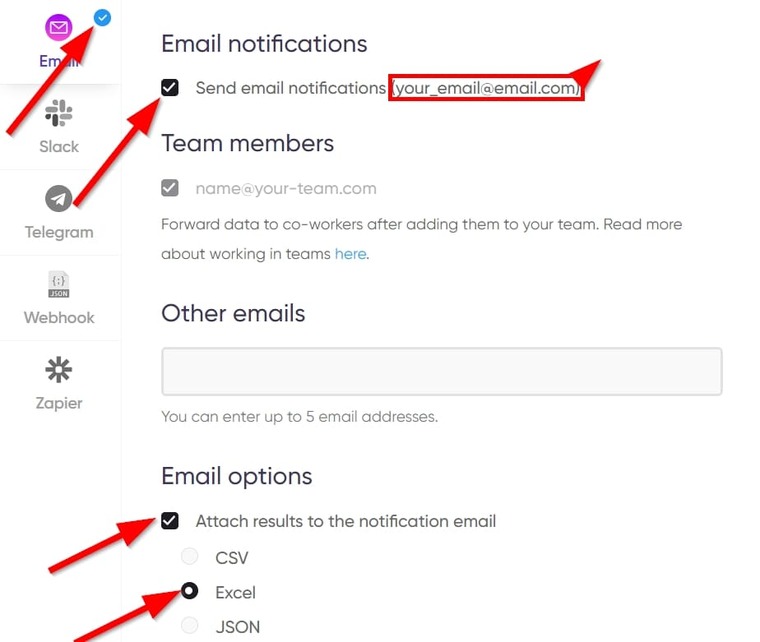
- Finally, click on “Start this bot” and you’re done! Easy peasy!

Once the Meta Tags Extractor is done, you will receive an email notification:
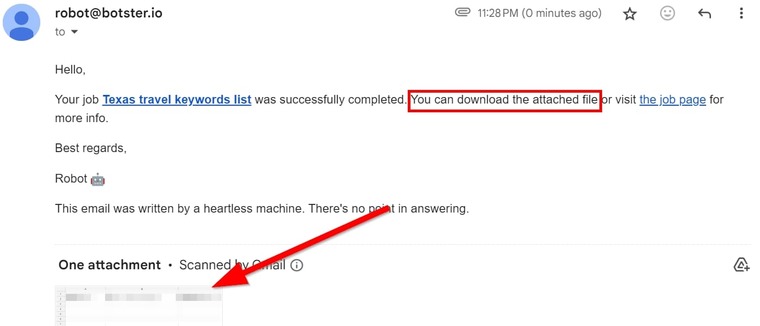
Below are some tips to help you make the most of the extracted data:
- Fetch the search volume of the extracted keywords using the Search Volume and CPC Finder as described below.
- Use the keywords with the highest search volume in meta titles.
- Use the keywords with somewhat lower search volume in meta descriptions.
Making up a travel related keywords list for your site pages
Why is it important to enrich site pages with travel SEO keywords?
Using relevant and well-researched keywords in your pages can help match your content with the search intent of your target audience. This can in turn increase both the quality and quantity of your website traffic, as well as your brand exposure.
The best keywords for travel agency sites are the ones searchers use to find whatever info they are looking for. So if someone searches “Is it expensive to go through a travel agent?” , using that term in your content can help you rank high.
That is why in this step, we’ll be extracting the most searched travel keywords with the help of the Google Search Suggestions Scraper . This bot can help extract search suggestions from Google, Bing, Yahoo, and YouTube.
Search suggestions are auto-complete search terms that pop up when you start to type in your search phrase into search engines:
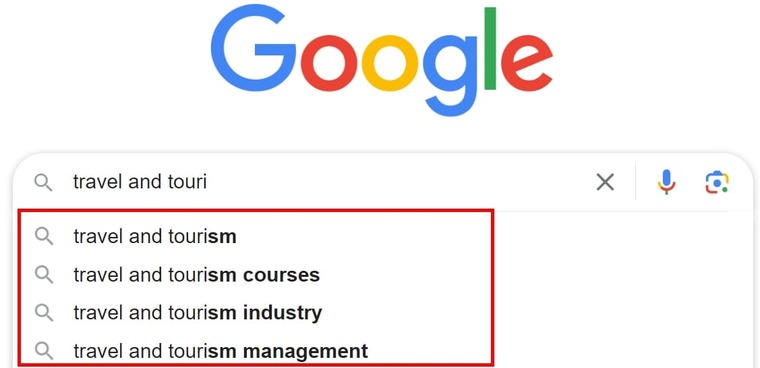
Setting up the Google Search Suggestions Scraper is quite straightforward. The steps are outlined below:
- Launch the Google Search Suggestions Scraper's start page and name your job. I’ll name this one “Texas travel keyword search suggestions” .
- Next, select your desired target region and language. I'm still looking for keywords for travel agency sites in Texas:

- Select the search methods you want the tool to adopt:

- Next, set a desired search depth:

- Now, select other search engines if you would love to extract their data too:

- Next, input your keywords. You can input multiple keywords but each one must go on a new line:
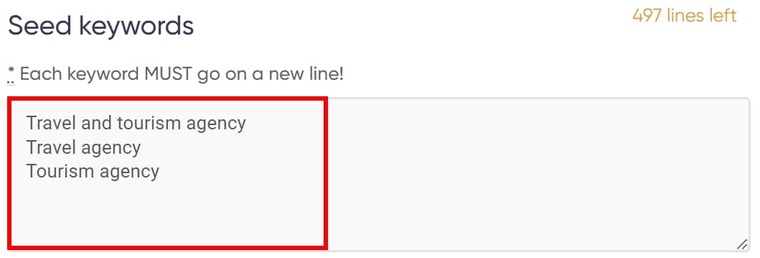
- Set your notification options, then click on “Start this bot” to launch the tool into action. This also launches the “My jobs” page to display something like this:
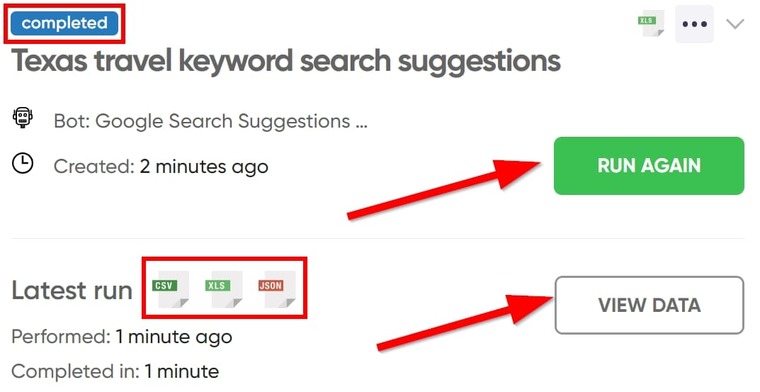
Video guide
Here’s a short video walkthrough of launching the Google Search Suggestions Scraper :
You can download the results extracted by the Google Search Suggestions Scraper by clicking on the XLS logo. Opening the file on your computer should display the top searched travel keywords thus:
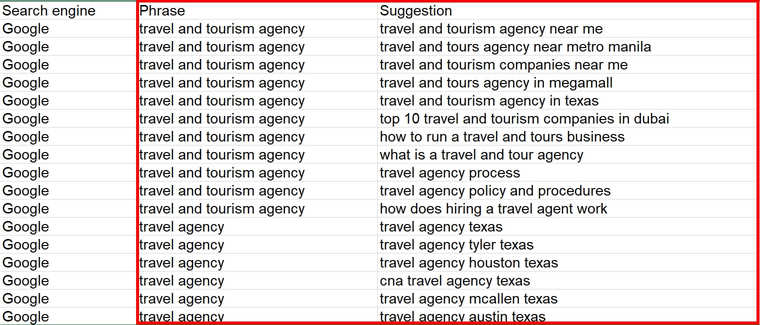
- Carefully select and use these keywords in the texts on all of your site pages to make them SEO-optimized.
- Read my guide on the best Ahrefs alternative for more keyword research tips.
Finding SEO keywords for travel blog posts
Nearly every successful site has a blog. This is because the blog is an excellent way to attract site traffic and build authority in the industry.
Blogs are meant to solve problems for actual users, but if your posts are not enriched with SEO keywords for travel blogs, they won’t rank high on Google, and people won’t be able to find them.
One of the ways to find the perfect travel blog keywords is to check what exactly people are searching for online. For this, we’ll be using the Google People Also Ask and Related Searches Exporter .
Here’s how to set up the Google People Also Ask and Related Searches Exporter to scrape keywords for blogs on travel for you:
- Launch the tool's start page and name your job as we did earlier.
- Enter your search keywords into the field titled “Search queries”. You can use new keywords or copy and paste the results from the previous extraction:
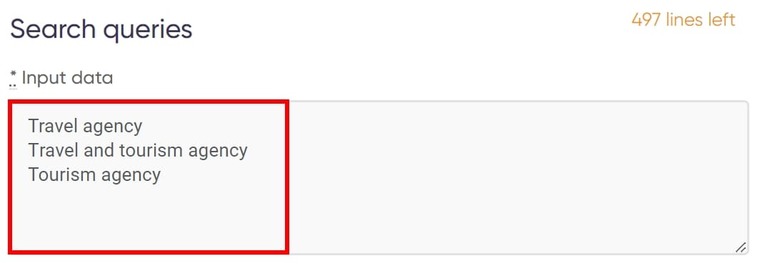
- Next, select which snippet you wish to extract:

- Set your custom options as needed:
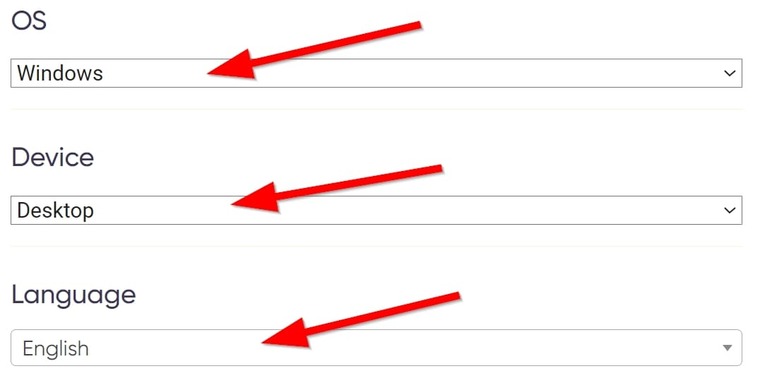
- Also, select your desired location for the search. Ideally, this should be the city or state you’re targeting. So mine is still Texas:
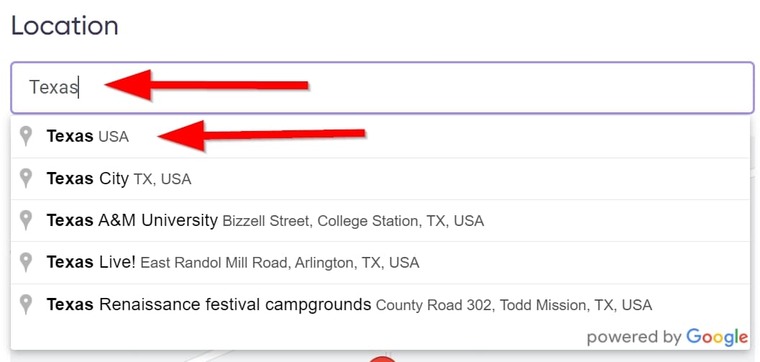
- Now you can start the bot and wait while it gathers your SEO keywords for travel agency sites.
Below is a video guide I made for this tool in case you’d like to watch me use it (I’m starting to speak about the Google People Also Ask and Related Searches Exporter at 07:19):
The results of this extraction should look similar to this:
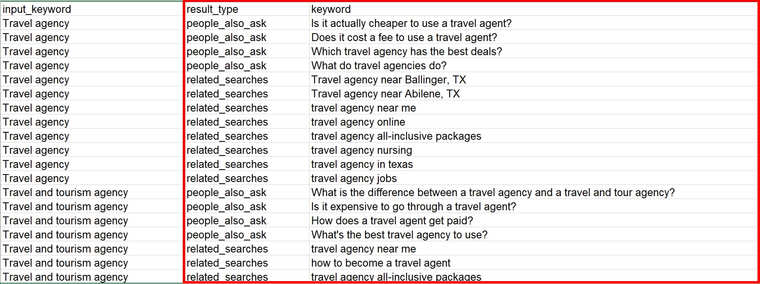
- The questions extracted from the “People also ask” widget are searched by actual people. So use them as blog topics (i.e. headings) to match your potential clients’ search intent.
- Use the keywords extracted from the “Related searches” widget randomly in the blog texts.
- Read my guide on lead generation for lawyers for more blogging tips.
How to single out the MOST SEARCHED travel keywords on Google
One final thing we have to do now is to pick the keywords with the highest search volume for use in our SEO strategy. The best keywords for travel blog posts are those with a high search volume but low competition.
Travel blog SEO keywords having high volume means they are regularly searched on Google. Having low competition means there’s little competitive effort over them.
Using the best travel keywords with high search volume and low CPC in SEO and advertising can grow your brand awareness as well as your customer base faster than you’d imagine.
For this step, we’ll be using the Search Volume and CPC Finder . This tool can fetch cost per click (CPC) and search volume data for keywords on Google in bulk.
Setting up the Search Volume and CPC Finder involves just one step, meaning that it won’t take you up to 10 seconds to get it over with:
- On the Search Volume and CPC Finder’s start page , paste all the keywords you’ve extracted so far into the field titled “Search keywords and phrases”:
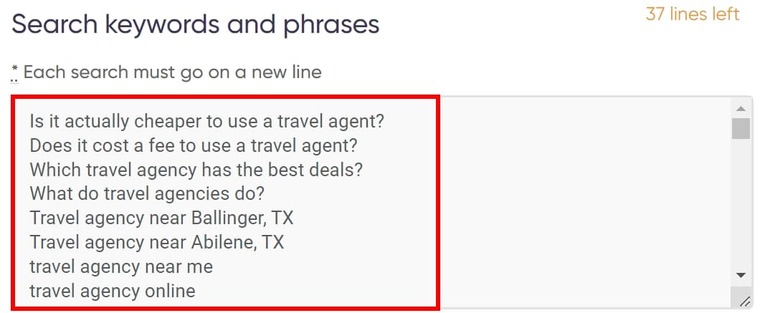
- Now click on “Start this bot” and you’re done!
Watch a quick video tutorial on how to use the Search Volume and CPC Finder :
Once the bot is done running, you can download the results file and open it on your computer. You can also separate the keywords into different groups where some go to the meta tags, some to website pages, and others within blogs:
- Sort the results in descending order by the column “Volume” .
- Remember that long-tail travel keywords (i.e. phrases that contain 4 words and more) match your clients’ search intent most precisely, meaning that their value for your site should not be underestimated despite lower search volume.
- Read my in-depth guide on ways to measure brand awareness where this bot is used for yet another purpose.
Free trial for the travel keyword search tools
Now that you’ve learned how to find the best keywords for travel websites using automation tools, you can boost your online presence with very little effort. At this point, though, you are probably wondering how much it will cost you to extract the top travel keywords list from Google using these tools.
Well, it will blow your mind to find that using all these tools combined costs less than buying a seat near the window on your flight to the Maldives and their benefits are even more enormous than I just showed you!
And because you took the time to read this guide and learn how to find keywords for travel blogger sites so you can rank your business higher on search engines, we are offering you a 7-day free trial that starts right after you open your Botster account .
This means that you gain unrestricted access to the dozens of tools available on Botster . So don't delay any further. Seize this opportunity right now and get started extracting keywords for your travel blog!
You are using an outdated browser. Please upgrade your browser to improve your experience.

Keywords for Travel: List of 300+ Keywords

Written by: Joey Randazzo, Founder of SEO Growth Partners Last Updated: 10/02/2023
A croissant in Paris. 🥐
A sandy beach in southern California. 🏖️
Or maybe an epic backpacking trip in the Canadian Rockies.🏔️
If you’re reading this, you’re likely a travel blogger and have gone to at least one of the places above.
And you’re trying to find the perfect keywords to share your experiences, inspire people to see the world, and hopefully make some money while doing it.
This guide shares some travel keywords that you should consider targeting and will hopefully provide a starting point and inspiration for future keywords.
Due to consistent algorithm updates , the relatively recent Helpful Content Update in late 2022, we’ve updated the written content that already existed on the page. We’ve written new content. And we’ve filmed new video content. Everything is up-to-date, fresh, and helpful for your business to dominate Google for 2023.
Free SEO Audit: Get More Travel Keyword Insights For Your Specific Business
No strings attached.
100% free SEO audit for your website done by either myself (Joey Randazzo, the owner) or one of our in-house SEO specialists.
Keywords for Travel
Keywords for travel + “best” (low difficulty), general keywords for travel (high difficulty), general keywords for travel (low difficulty), keywords for travel + “beaches” (low difficulty), keywords for travel + “mountains” (low difficulty).
- Keywords for Travel & Safety (Low Difficulty)
Portland SEO Growth Partners: Let Us Help You Find the Most Valuable Keywords for Travel That Your Website Should Be Ranking for With a Free Audit
Keywords for travel & safety (low difficulty).
Click on “Free SEO Audit” in the upper right corner of your screen if you’d like some help (oh yeah, did we mention it’s free yet?) on ranking for travel-related keywords.

Joey Randazzo
Owner & CEO of Portland SEO Growth

- Locations We Serve
- Free SEO Resources
- Keyword Research by Topic
Our Services
- Google Maps Marketing
- Content Creation for SEO
- On-Page SEO
- Off-Page SEO
- SEO Strategy
- Technical SEO
- Voice Search
- Reputation Management
- International SEO Consulting
About & Contact
- Portland SEO Growth Partners
- Portland, OR
- (503) 487-8677
Industries We Serve
- SEO For Accountants
- SEO For Art Galleries
- SEO For Assisted Living
- SEO For Bookkeepers
- SEO For Chiropractors
- SEO For Contractors
- SEO For Construction Companies
- SEO For CrossFit Gyms
- SEO For Dispensaries
- SEO for Florists
- SEO for Flooring Companies
- SEO For Furniture Stores
- SEO For HVAC
- SEO For Interior Designers
- SEO For Jewelers
- SEO For Medical Practices
- SEO For Medical Spas
- SEO For Orthodontists
- SEO For Orthopedic Doctors
- SEO For Painters
- SEO For Pest Control Companies
- SEO For Photographers
- SEO For Physical Therapist
- SEO For Plumbers
- SEO For Psychologists
- SEO For Real Estate Agents
- SEO For Remodelers
- SEO For Roofers
- SEO For Veterinarians
- SEO For Web Designers
- SEO For Wineries
Travel Keywords: Top Google Adwords Keywords for Your Campaign

Are you looking for top Travel keywords for your Google Ads? Congratulations! You are in the right place! With the help of the Free Google Tool , we've created a list of the most searched Travel keywords for you. Incidentally, you can also use this keyword list for Travel SEO, which is equally helpful.
The Most Searched Travel Keywords (1-50 of 500)
Log In AdTargeting to See More Travel Keywords.
As you may have noticed, these top Google ads keywords for Travel are very popular, but also expensive and competitive. If you want to avoid competition, using long tail keywords for Travel is a natural fit. With AdTargeting , we get some good long tail keywords for Travel and share them with you.
Long Tail Keywords for Travel(1-50 of 500)
Log In AdTargeting to See More Long Tail Keywords for Travel.
Do you want more low competition, hign traffic Travel keywords?
Just enter Travel in the search box, you can get hundreds of Travel keywords to do keyword optimization, attract customers, and improve Google Ads ROI!

How to Do Keyword Research to Travel with AdTargeting?
As the best google ads keyword planner, AdTargeting can help you research Travel keywords as follow:
Step 1: Analyze Travel keywords by search volume, CPC and PD to judge the effectiveness of keyword advertising.
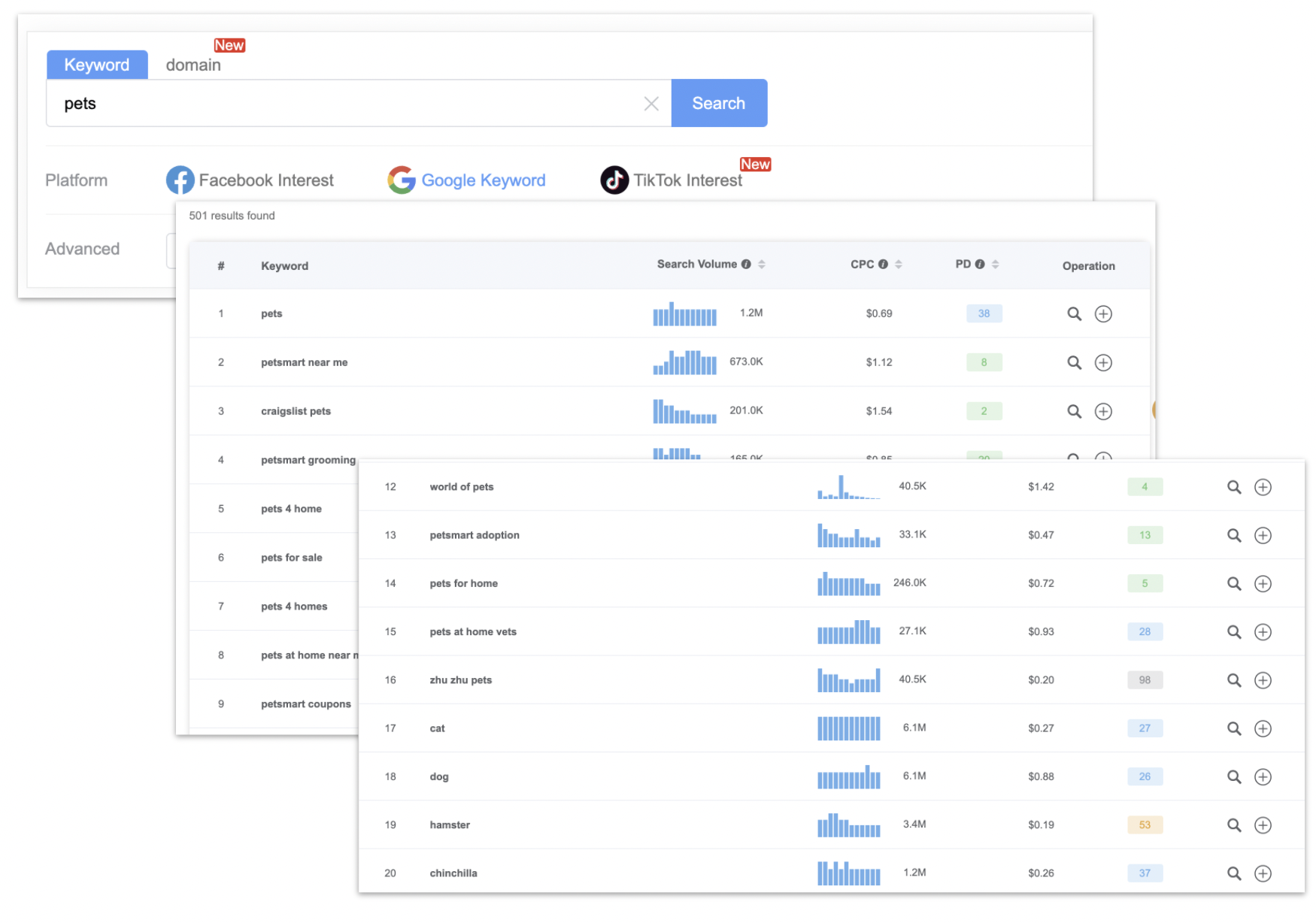
Step 2: Based on the search trends and popular areas of each Travel keyword, determine if it is rigt for you.
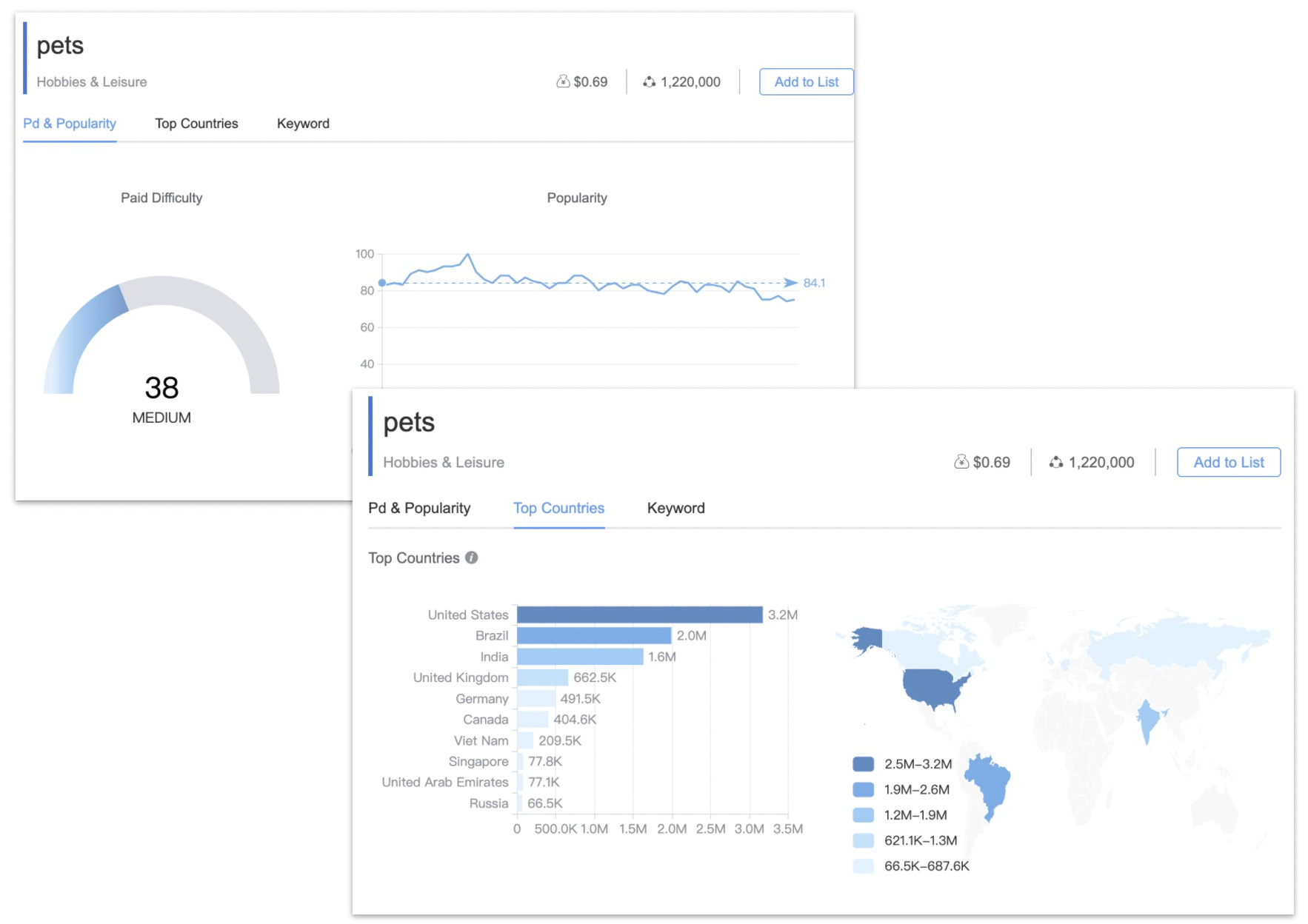
Step 3: Enter your competitor's site in the search bar to find out which Travel keywords are driving traffic for them, and download the keywords.
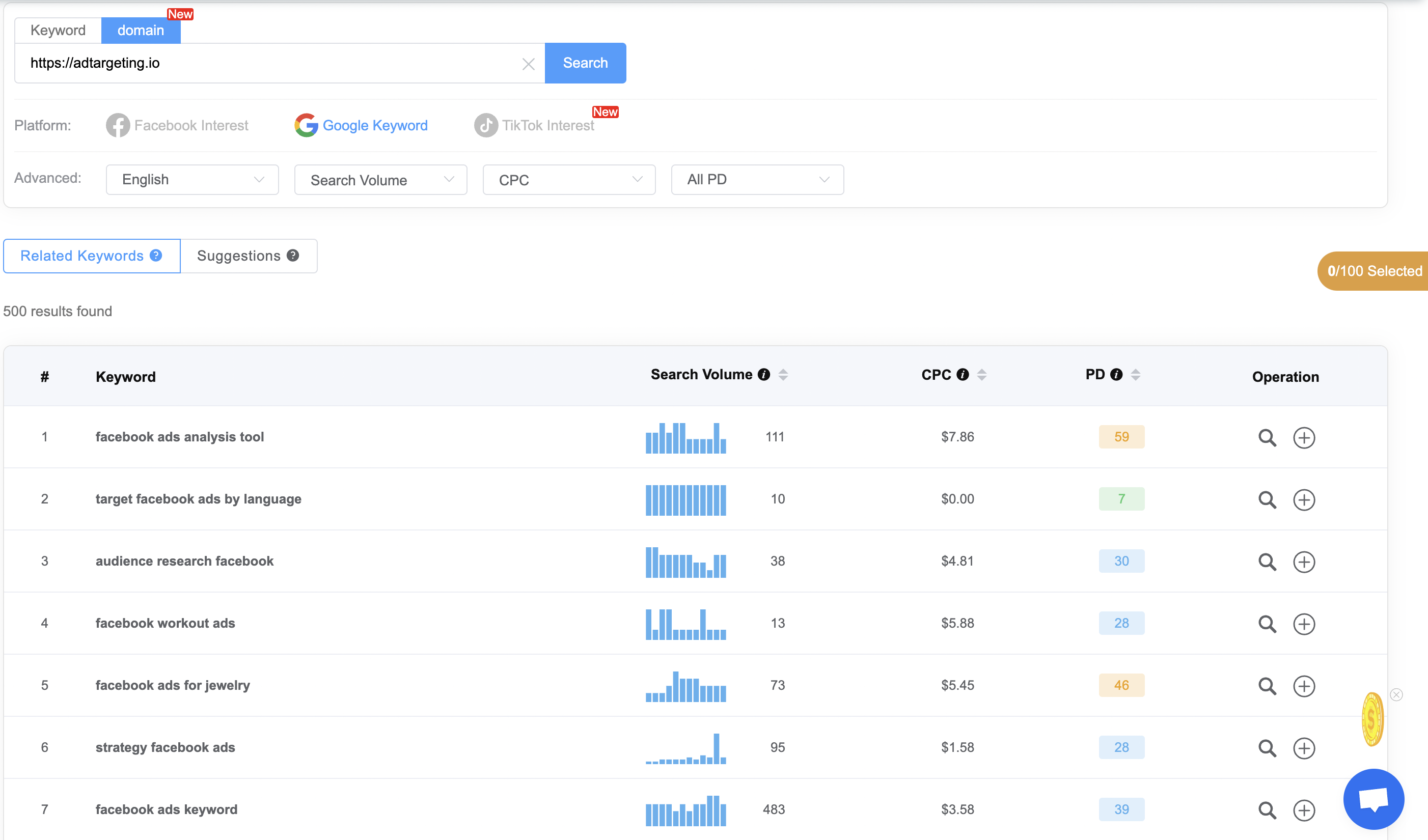
By the above, you can get the most comprehensive Travel keywords and maximize the effectiveness of your Google Ads.
Google & Facebook & Tiktok Ads Blogs
Top adwords keywords.
Apparel Keywords
Arts & Entertainment Keywords
Beauty & Personal Care Keywords
Business & Industrial Keywords
Computers & Consumer Electronics Keywords
Dining & Nightlife Keywords
Family & Community Keywords
Finance Keywords
Food & Groceries Keywords
Health Keywords
Hobbies & Leisure Keywords
Home & Garden Keywords
Internet & Telecom
Jobs & Education Keywords
Law & Government Keywords
News, Media & Publications Keywords
Occasions & Gifts Keywords
Real Estate Keywords
Retailers & General Merchandise Keywords
Sports & Fitness Keywords
Travel & Tourism Keywords
Vehicles Keywords
Discover hidden or niche interests, and get a keyword search & trend database every day!
100000+ advertisers use AdTargeting

- Privacy Policy
Finding The Right Travel Keywords as A Human: 7 Easy Ways
Last Updated on November 14, 2023 by The Digital Travel Expert
If you are reading my article today, it is because the search engines have detected your need through the keywords you typed in the search bar. However, it is worth mentioning that the first research started way before you grabbed your device to do research. You wanted to get information about a certain topic or product—for instance, the best SEO travel keywords.
The process of gathering and analyzing data began long before you even considered searching for it. In other words, all we do on our devices starts circulating in the human brain, shaping our thoughts and influencing our decisions.

If you’ve been thinking about how best to find travel keywords , this is the right article for you.
Table of Contents
Importance of using the right travel keywords for better online visibility
The tourism sector (travel and hospitality) is a vast field where you can easily get lost if you don’t have the right tools to navigate safely.
Every single day, new travel businesses, hotels, and other tourism-related organizations are born, making it a highly competitive industry.
On the other hand, it is a profitable business sector if you know how to find the right spot. Doing the right keyword search and producing relevant content is one of the pillars of the travel SEO strategy . The following paragraph will discuss the benefits of leveraging travel SEO for businesses to serve the right audience.
Benefits of targeting the right audience with relevant travel keyword strategy
Every effective SEO strategy must include thorough keyword research and analysis. The goal is to serve the interests and needs of the target audience. If you are a luxury travel company or a hotel, you don’t want random people to visit your website. You want to attract affluent travelers- those individuals who are interested in luxury travel experiences or accommodations. Your SEO strategy efforts will be in vain if you fail to target the right audience, or it is time to review your travel keywords everywhere needed.

Overview of how to find the best travel keywords
Firstly, there is no such thing as the best keywords in SEO ; the right or best ways are the ones relevant to your target audience’s needs. My teacher, who taught me” Introduction to Digital Marketing Principles” usually answered, It depends”. Indeed, it depends on your niche, audience, and ultimately your business goals. If you are exploring a new travel niche, you will need to use key phrases that your visitors type when looking for information such as things to do and where to stay.

So, the best travel keywords depend on the message you want to convey through your content. Consider what your fellow human might want to type into a search engine when searching for relevant travel information. Some examples of travel SEO phrases include popular attractions, local cuisine, and cultural events.
Quick Understanding of Your Target Audience : How do I identify my SEO keyword?
As briefly introduced in the previous paragraphs, the choice of your target audience defines the choice of the right travel keyword or search phrase. Key elements of keyword research involve identifying their demographics, interests, and preferences.

When you can anticipate their needs and desires, you will be able to tailor your content and choose a travel SEO keyword that resonates with them.
Researching demographic and psychographic information of your target audience
The tourism sector is all about humans finding solutions for their needs and challenges. Life needs tend to change based on psychological, emotional, and social factors. The age and location of your target market play a non-negligible role. It is not enough to merely rely on keyword search tools when developing a travel SEO strategy. You need to understand on a personal level what your fellow human living in x country or continent would need when traveling to x destinations at x time of the year.

Just put it simply: Find the proper travel keyword you use when looking for an African safari adventure”. There will be different types of search phrases depending on personal preferences, season, number of travelers, and interests. To serve specific needs in their travel SEO strategy, experts use long tail keywords.
Analyzing their travel preferences, interests, and motivations
Travel preferences are closely linked to our personal experiences and desires. What content would you produce for an introvert who wants to travel overseas? According to a Forbes article , s tudies show that introverts make up 30% to 50% of the U.S. population.

For an introvert who wants to travel overseas, it would be important to focus on finding travel key phrases and creating content that highlights quieter and more secluded destinations where they can enjoy solitude and tranquility.

You need to be careful because you won’t include “introverted people in your keyword strategy” or SEO travel content . But through your travel packages and articles, you can convey a message that appeals to introverts as well. Private tours vs. group tours might, for instance, appeal to two different personalities. So, leveraging human imagination and keyword research tools should be your best companions.
Identifying popular destinations and types of travel experiences they seek
Doing SEO aimed at attracting qualified visitors to popular destinations is tremendously hard. Every business wants to come first in the SERP (search engine result pages).

The good thing is that the human brain hates routine. In times when travel preferences are constantly changing and evolving, staying up-to-date with the latest trends is essential for any travel business. If you opt for a static marketing strategy, you will likely fall behind your competitors.
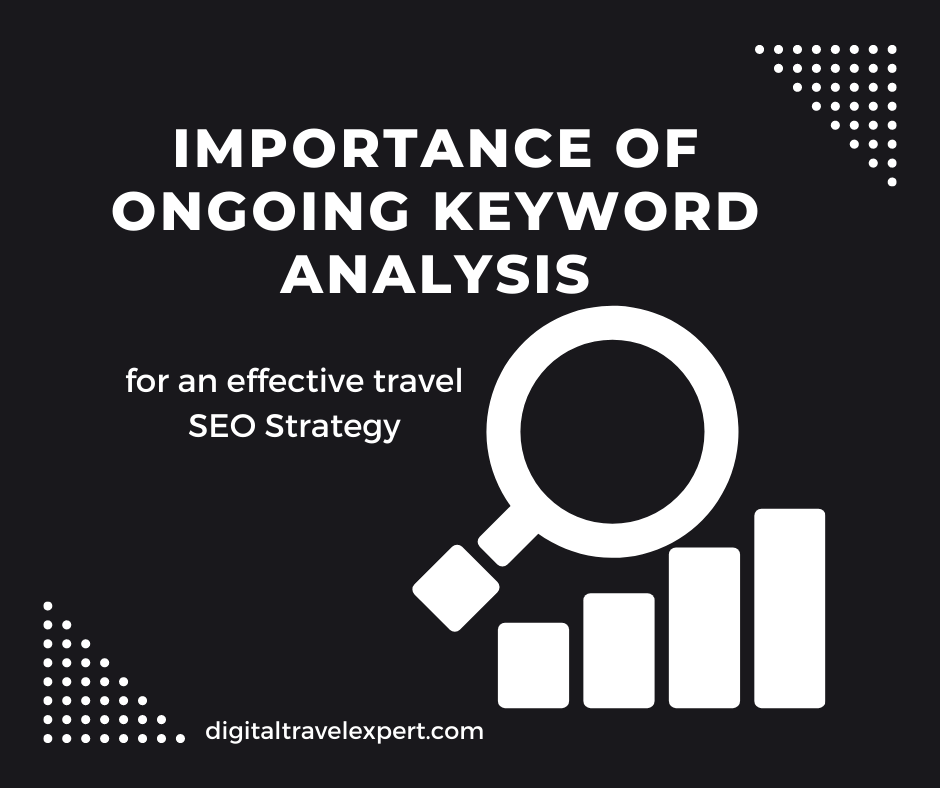
Alternatively, if you spot a gap between popularity and quality, you will be able to capitalize on it and gain a competitive edge. So you will need to build a list of long-tail keywords that will grab a user’s attention and drive traffic to your website. The tourism and winery industries are different; while old might mean gold in the winery, old means the opposite in tourism. The travel sector needs constant changes and updates.
FAQs about Travel SEO Keyword Strategy
What is the best advice digital marketing strategy for travel agency seo.
The best advice for a digital marketing strategy for a travel agency SEO is to find and understand human needs, find the keywords, and create high-quality, informative content that is relevant to your target audience and connects them with your travel brand on a personal level .
How do I find the keyword for my travel blog?
Don’t start a blog because somebody says a travel blog is cool. Before even thinking about what to write, do your due diligence and find out what your travel content will need to achieve and who needs it. You will later need to conduct keyword research using online tools such as Google Keyword Planner, Ahrefs, SEMrush, etc.
What is SEO in the travel industry?
SEO in the travel industry refers to the practice of optimizing websites and travel content to attract qualified leads and improve their visibility and ranking on search engine results pages (SERPs) for relevant travel-related phrases.
What is the popular travel keyword?
Results show that popular travel keywords include destinations, flights, hotels, vacation packages, tours, attractions, travel tips, travel insurance, and adventure travel. Those keywords are used by travelers to find relevant information and resources for planning their trips. There are also travel niche keywords that vary depending on current trends and the specific interests of travelers such as eco-tourism, luxury travel, budget travel, or solo travel.
What is an example of a keyword for travel blogs?
An example of a keyword for travel blogs could be “best travel destinations” or “travel tips and tricks.” These travel SEO phrases are commonly searched by individuals looking for travel inspiration and advice, making them effective in driving organic traffic to your travel blog. However, it is important to note that using a generic keyword like these may not always yield successful results.
For instance, if a travel blog specifically focuses on offbeat destinations or unusual travel experiences, using a keyword like “best travel destinations” may not accurately represent the content and may attract the wrong audience. In this case, more specific phrases such as “ unique travel experiences ” or “offbeat destinations” would be more appropriate and effective in reaching the target audience.
Finding keywords for your travel business involves leveraging human skills and SEO knowledge. Firstly, it is essential to conduct thorough research and analysis of the target audience’s preferences, interests, and search behavior. It is also the way marketing travel experts use for effective segmentation targeting and positioning . Keyword search tools are not enough, but engaging in conversations with experienced travelers or industry professionals can provide valuable insights into the specific keyword strategy that resonates with potential travelers.
Share this:
Recommended for you.

This post was not just informative but also very thought-provoking. Thanks for sharing your insights!
Leave a Reply Cancel Reply
Save my name, email, and website in this browser for the next time I comment.
Notify me of follow-up comments by email.
Notify me of new posts by email.

Most Searched Travel Keywords in Google 2024
Traveling has always been a favorite pastime for people all around the world. With the rise of the internet and search engines like Google, people can now plan and book their travels with just a few clicks.
As a result, the travel industry has grown tremendously, and so has the competition among travel companies to rank higher in search engine results pages (SERPs).
In this article, we will explore the most searched travel keywords in Google, how to use them for SEO, and how they can benefit your travel business.
Table of Contents
Understanding Travel Keywords
Keywords are the words or phrases that people type into search engines like Google to find information.
Travel keywords are those that relate to travel, vacations, and tourism. They can be broadly classified into two categories: informational and transactional keywords.
Informational keywords are those that people use to find information about travel destinations, travel guides, and travel tips. Examples of informational keywords include “best beaches in the world,” “ top travel destinations in Europe,” and “how to plan a budget-friendly trip .”
Transactional keywords, on the other hand, are those that people use to purchase travel-related products or services.
Examples of transactional keywords include “ cheap flights to Bali,” “all-inclusive resorts in Hawaii,” and “best car rental deals.”
The Top Searched Travel Keywords
To determine the most searched travel keywords, we used various keyword research tools, including Google Keyword Planner and Ahrefs . Here are the top searched travel keywords:
Top Informational Travel Keywords
- Best places to travel in the world
- Travel destinations in Europe
- Budget travel tips
- Travel guides
- Best time to visit Hawaii
- Best beaches in the world
- Things to do in New York City
- Traveling with kids
- Traveling alone
- Adventure travel
Top Transactional Travel Keywords
- Cheap flights
- All-inclusive resorts
- Best hotel deals
- Cruise deals
- Car rental deals
- Travel packages
- Last-minute travel deals
- Vacation rentals
- Flight and hotel deals
- Luxury travel
List of Most Searched Travel Keywords in Google for SEO
How to use travel keywords for seo.
Using the right keywords can make a huge difference in your travel business’s online visibility. Here are some tips on how to use travel keywords for SEO:
Conduct Keyword Research
Conduct keyword research to find the most relevant and high-volume travel keywords. Use tools like Google Keyword Planner, Ahrefs, SEMrush, and Moz to find the best travel keywords that will help you rank higher in SERPs.
Optimize Your Website
Optimize your website by placing your target keywords in strategic places like title tags, meta descriptions, H1 tags, and content.
Make sure your website is mobile-friendly, has a fast loading speed, and provides a great user experience.
Create High-Quality Content
Create high-quality and informative content around your target keywords. This will help your website rank higher in SERPs and attract more visitors to your website. Make sure your content is engaging, unique, and informative.
Build Quality Backlinks
Build quality backlinks from other authoritative websites. This will increase your website’s domain authority , which will help you rank higher in SERPs.
How Travel Keywords Can Benefit Your Business
Using the right travel keywords can benefit your travel business in the following ways:
Increased Online Visibility
Using the right travel keywords can help your website rank higher in SERPs, which will increase your online visibility and attract more visitors to your website.
Better Targeted Traffic
Targeting the right travel keywords can attract more relevant traffic to your website . This means that people who are interested in your travel products or services are more likely to visit your website, increasing the chances of converting them into paying customers.
Improved ROI
Using the right travel keywords can improve your return on investment (ROI) by attracting more relevant traffic to your website. This means that you will spend less money on advertising and marketing, and get better results.
Competitive Advantage
Using the right travel keywords can give you a competitive advantage over your competitors. By ranking higher in SERPs for your target keywords, you can attract more visitors to your website, which can translate into more sales and revenue for your business.
In conclusion, understanding the most searched travel keywords in Google can help you optimize your travel business’s online visibility and attract more relevant traffic to your website.
By conducting keyword research, optimizing your website, creating high-quality content, and building quality backlinks, you can improve your search engine rankings and gain a competitive advantage in the travel industry.
What are travel keywords?
Travel keywords are the words or phrases that people use to search for travel-related information or products/services.
Why are travel keywords important for SEO?
Travel keywords are important for SEO because they help travel businesses optimize their online visibility and attract more relevant traffic to their website.
How can I find the best travel keywords for my business?
You can find the best travel keywords for your business by conducting keyword research using tools like Google Keyword Planner, Ahrefs, SEMrush, and Moz.
Can using travel keywords improve my ROI?
Yes, using the right travel keywords can improve your ROI by attracting more relevant traffic to your website.
How can I use travel keywords to gain a competitive advantage in the travel industry?
You can use travel keywords to gain a competitive advantage in the travel industry by ranking higher in SERPs, attracting more visitors to your website, and converting them into paying customers.
Leave a Comment Cancel reply
Save my name, email, and website in this browser for the next time I comment.


Keyword Research for Travel & Tourism – How to Find the Best Keywords for SEO
Finding the best travel keywords.
We recently launched our Live Case Study with The Travel Aisle and we’ll be using this as a vehicle to share our best SEO tips and knowledge in a live environment that you can follow along.
The first stop for any website should be keyword research. Travel is a highly competitive industry and it’s important that you identify which areas to target before you build your site (and even launch your business) so you know what is achievable and realistic in attracting customers from search.
This post aims to give you the lowdown on which travel SEO keywords are best for companies in this industry, and how to go about finding them so you can leave with an actionable plan to go and put in place.
What is Keyword Research?
Keyword research is all about identifying how your target audience search for your product or service and then using that information to inform your on-page targeting for SEO purposes.
If you design and build a website without this information it’s highly likely you won’t target the right areas and won’t get found by the right people as a result. This means less of your target market find you and you sell less stuff. That’s bad.
Keyword research is strongly associated with SEO, but it is also a fantastic way of gaining insight into your audience and your market that you may not otherwise know.
In travel this might be that more people search for ‘burma holidays’ than ‘myanmar holidays’ or hostels are more popular than boutique hotels. It’s not just about updating your title tag and the text on your site, it’s much more valuable on that for wider business insights too.
Overlook it at your peril.
The Impact of the Longtail
One of the key areas people go wrong when choosing keywords is exactly that. They choose a small set of phrases that they see as the be-all and end-all. Rank for those or bust.
You should discard this mentality right now. Or stop reading, because you’re not going to like what’s coming.
Keyword Research is about finding all the phrases (or topic areas at least) your audience is searching for, and then mapping those findings onto your site. It will inform your site architecture, the pages you have on your site, the text you use: everything!
People are always drawn to the phrases that have the highest search volume which is a natural reaction. You want to target the phrases that people search for the most right? Well, kind of, but it’s not as simple as that.
You definitely want to have pages on your site that target the most-searched-for terms, but those phrases will often be extremely competitive and difficult to rank on page 1 for. The real wins, particularly for new or smaller sites, are in the longtail phrases that your audience is searching for. SEO for travel blogs often focuses on this.
The longtail is made up of a huge variety of different phrases, but when added together these phrases usually result in a much larger volume of traffic than the headline phrases that most people focus on.
For example, consider the hypothetical scenario below:
- The phrase ‘spain holidays’ gets 22,000 searches per month.
- There are 22,000 phrases which include ‘spain’ that are about travel (e.g. ‘best time to visit spain’)
Even if the phrases in the second option only have 1 search per month each, it adds up to the same amount of searches. Guess what? Usually, they have more than one so they add up to much more.
You can also rank for the majority of these phrases much more easily than the headline phrases like ‘spain holidays’. Would you rather try and rank for 22,000 different phrases that are less competitive and each brings one visit to your site, or put all your eggs in the basket of the one phrase which is the most competitive out there?
I know which I’d go for.
Google has also recently shared that 15% of the phrases they see every day are completely new, so you can see that the longtail is constantly growing, and the opportunity is huge if you set your site up to capture that traffic.
So how do you do that?
Topics vs Phrases
The best way to target the longtail is to do keyword research that identifies all the different topics that are relevant to your site. Start by finding individual phrases, but then build that list out so you can see all the different phrases that exist which are relevant to you.
We have launched The Travel Aisle site with our initial pages focused around where to travel throughout the year. We did our keyword research and found there was a good amount of interest for phrases like ‘where to go in November’ and ‘where to go in March’.

But we didn’t stop there, we kept digging, and found a huge variety of phrases in those same topic areas that we could target:
- where to go in march – 900 searches/month
- best places to visit in march – 500 searches/month
- where to go on holiday in march – 600 searches/month
- best holiday destinations in march – 300 searches/month
There’s plenty more where that came from.
Your task is to look at your particular niche, whether it is a particular destination, type of travel or informational topic and build out a comprehensive list of phrases and topics that are relevant to your site.
Only then can you map it on to your site with the content you produce in the most effective way when you have the full picture laid in front of you.
The Keyword Research Tools You Need
There are lots of useful free and paid keyword research tools out there which you can use to find travel keywords for SEO .
If you really have no budget to work with then check out:
Soovle – Add a phrase and let this tool throw loads of suggestions at you based on a variety of sites.
Answer the Public – nicely presented information based primarily on the questions around the topics you search for.
Keywords Everywhere – A plugin for Google Chrome that highlights lots of options when you search in Google (and other places).

These tools can give you a good start if you’re prepared to put in a lot of hours, trawl through a lot of data and truly have no budget to work with (here are some other free SEO tools you might find useful).
However, I’d suggest that for a job this important it is worth investing some budget. There are lots of good paid keyword research tools out there, but having used many of them my recommendation would be Ahrefs .
The great news is that you can use this incredible tool for just $7. That’s just for a 7-day trial, but if you really are strapped for cash then you can spend $7 and do all your keyword research in those 7 days and give yourself a fantastic action plan and set of data to work from.
The even better news? It’s not just a keyword research tool. So as well as getting your keyword research data in those 7 days you could also get loads of link data , do competitor analysis and much more.
I expect you’ll end up wanting to use it for longer, but the option is there to just get all this information for the handsome sum of $7 (£5.34 in real money) if you dedicate a week to it.
And whilst I’m not getting paid anything to say this, I’d highly recommend it. And if you want to follow the tips and advice in the rest of this post, you’ll need access to it.
If you’d prefer to go the free route, here are a few excellent posts that show you how to do that without paid tools:
Free Keyword Research Tools Step by Step Keyword Research Guide with Free Tools How to Research Keywords
Finding Keywords and Topics Using Ahrefs
Ahrefs has a number of fantastic ways of finding good target keywords for travel that you can then incorporate into your site structure and content.
The Keywords Explorer Tool.
This allows you to put in ‘seed’ words and surfaces all the top searched travel keywords that include those words. My favourite approach with this is to use the most pared-back set of words to start with, then filter on the ‘Having same terms’ report.
This highlights all phrases that include that combination of words, in any order:

Another interesting thing you can gain from this report is in the ‘Parent topic’ column. This tells you the topic Ahrefs perceives this phrase to be part of. Click it and it will lead you to another treasure trove of keyword options to add to your list.
You can then take these new phrases and feed them back into the ‘Having same terms’ report and rinse and repeat.
Doing this process on its own can leave you with more than enough information to make an excellent go of the keyword research process and develop a site into a really strong position.
But if you’re the kind of person who just won’t quit, then you’re going to want to have a sniff around some competitors too.
The Site Explorer Tool
If we search for ‘best places to go in March’ the top result currently is CN Traveller . I can take that URL and put it into the Site Explorer and then view the ‘Organic Keywords’ section:

This page alone ranks for more than 1,000 phrases in Google.com. And Ahrefs is estimating it gets nearly 11,000 visits/month! Remember what I was saying about the longtail…
The main thing you can take from this report at page level is that if this page ranks for one of the big competitive phrases, it will probably rank for a lot of the longtail variations too. So all you have to do is sift through the list and add those phrases to your list.
You can also do this for lots of people on page 1 for your target phrases, which will only increase the pool of phrases you have even further.
The example above is doing this at page level, but you can also do this for an entire site to see where your competitors are getting the most traffic and which phrases that traffic is coming through.
You can do this with the ‘Organic Keywords’ report shown above for an entire domain, but I also like using the ‘Top Pages’ report, which shows the pages on the domain which Ahrefs estimates are getting the most traffic from search:

You can then click through to each one for the more specific breakdown of each page and the phrases it is ranking for.
As you can see, we’ve chosen a nice easy set of initial target pages to go after with the case study ;)

How to Judge Keyword Difficulty
Many people will ask how hard it is to rank for certain phrases or how long it will take to reach page 1.
The honest answer is you will never know for sure. The keyword tools can give you an estimate, but I don’t really trust these figures. You see small sites ranking on page 1 for phrases with high difficulty scores and then phrases with low difficulty scores that appear almost impossible to break when you look at who’s on page 1.
My advice is always that if the topic is relevant for you, you should create great content for it that matches up to the people ranking on page 1, and ideally is even better. If you do that consistently you will start to see success with some of those posts and your traffic will grow through longtail phrases.
Here’s what happened with our client Roma Experience when we started putting this approach into practice:

And I’ve only done this in a minor way with the SEO Travel site, but we’ve still seen solid growth as a result:

If you only take one thing away from this post, it should be that keyword research is crucial to the success of your website, and potentially your business too.
My advice would be to spend $7, dedicate a week to this process, and come out the other side with a proper action plan in place that you can use to shape your site’s growth for years to come.
I’ll be following this post up with a guide on how to take the findings from your keyword research and truly maximise them with the structure of your site as a whole and at individual page level.
Stay tuned!

Popular Posts
Introducing The Travel Growth Accelerator
Workation Inflation: Hybrid And Remote Working Report and Statistics
100% Impact – 2023
Our 10 Favourite Travel PR Campaigns Created During 2022
21 Mistakes Travel Businesses Make When Building A New Site
About the author
Tom formed SEO Travel in 2011 when he saw the struggle agencies were having offering a quality service to companies in different industries. Having worked in SEO, PR and as a writer, as well as travelling extensively, he brought together all his skills to offer a specialised service for travel companies. The company has grown from there as we have continued to get great results for clients and steadily attracted new business.
Latest from the Blog
- Take A Journey With… Duncan Grossart – Founder of Journeys With Purpose
- 90% of AI Travel Itineraries Are Inaccurate – From Permanently Closed Attractions to Fictional Cafes
- Take A Journey With… Claire Copeman – Co-Founder of Adventure Tours UK
How to Assess Backlink Quality: A Guide
Get In Touch
Become Our Next Case Study
- Join the Team
- Get a Proposal
- Privacy Policy
- The Travel Growth Accelerator
LATEST POSTS
+44 1943 603159
SEO Travel Platform Building, New Station Street, Leeds, LS1 4JB
SEO Travel is a trading name of Rombald Group Ltd, Registered in the UK, Company Number 8417732, VAT Number 173519302
Tips & Tricks
By checking this box, you agree to receive travel insight, marketing tips, and updates from SEO Travel. We take your privacy seriously.
Please leave this field empty.

Travel Keywords: Ultimate List Of Ideas For Tour Operators
Every time your ideal customer goes online to research their next trip, they type travel keywords into the search engine. If you don’t know what these keywords are, it’s very difficult to know how to optimize your content for SEO.
SEO is the biggest driver of organic traffic to your website. When you use the right keywords in your content, you can potentially get greater visibility online.
Although the travel industry is a competitive space to be in, with basic SEO knowledge and keyword research, you can set your website up to attract more visitors.
Here, we’ll quickly walk you through how to identify your ideal keywords. Plus, we’ve included a list of general keyword ideas to point you in the direction of getting started.

How To Pinpoint Your Ideal Travel Keywords
When identifying travel keywords for your web content, there are three points to think about:
- Search Volume : The number of times users search a keyword in a month. The higher the search volume, the more web traffic you can potentially get from the keyword.
- Difficulty : Generally speaking, keywords with a higher search volume and commercial intent are more difficult to rank for. And if you’re competing against loads of high-authority websites for a specific keyword, this will also make it more challenging to rank for.
- Search inten t: When people enter keywords into the search bar, does the content in the results give them the information they are looking for? Offer the information that the person wants, and the keywords will bring you relevant traffic, not just a lot of traffic.
Our guides on how to do keyword research and local keyword research have more tips and insights on the subject.
Tools For Finding Travel Keywords
There are plenty of awesome SEO tools to help you find relevant and up-to-date keywords for your tour operator business. These tools are easy to use and offer some fantastic insights to improve your online visibility.
For a free tool, you can try Wordstream . You can check what keywords your competitors are ranking for, get ideas for the travel industry, and narrow down the results to be relevant for your state or country.

Another free option is Keywordtool.io . This generates hundreds of long-tail keywords, questions, and related prepositions based on the search term you enter. Long-tails can be useful as they often have a more focused search intent and lower difficulty.
There is also Ubersuggest , which provides a certain amount of daily free insights. Enter a domain or keyword, and the tool will bring all sorts of data, including keyword and content ideas.
For a paid keyword that gives greater insight, Ahrefs is a winner. Get a deeper look into keywords, backlinks, competitor analysis, content gaps, and more.
Travel Keyword Ideas For Your Business
To rank on the search engines, you need to start with a keyword.
We did a bit of research using the tools mentioned above to give you general ideas on what travelers are typing into search engines right now.
Keywords can be written into your website content so that you begin to rank for them in the SERPS. Include the terms naturally and optimally in your landing pages, blog posts, tour descriptions, website copy, product write-ups, social copy, adverts, and more.
Also, keep in mind that keywords are in a constant state of flux based on current market trends and conditions. For example, search volumes on travel insurance and travel restrictions are likely to currently be higher than they have ever been because of the COVID-19 pandemic.
High-Volume Travel Keywords
Here is a list of high-volume keywords related to travel in general. This is what people are searching for right now on the topic of travel and tourism.
Keywords That Travelers Might Use To Find Your Business
This list of general keywords includes a few terms that travelers might use to find you online.
Keywords To Describe Tours & Types Of Travel
These keywords are some of the popular tour and trip types that travelers are currently searching on the internet.
Final Thoughts
While these are pretty general keywords, they do at least provide a base from which you can brainstorm ideas for your travel business.
Because travel is a hot topic online, the competition on the SERPs is pretty high. Taking a data-informed approach to optimizing your content will better position your website for ranking.
Remember, ranking content on search engines is not a quick fix and doesn’t happen overnight. So, it’s a good idea to include other types of marketing in your overall strategy to grow your travel business.
To get more content like this sent directly to your inbox, sign up below for WeTravel’s newsletter.
New resources, straight to your inbox
We’re committed to your privacy. WeTravel uses the information you provide to us to contact you about our relevant content, products, and services. You may unsubscribe at any time.
About the author

Related Posts
Customer success story – happy gringo, customer success story – nepal eco adventure, customer success story – one yoga.

Keywords by Industry: The Top Traffic-Driving Terms for Every Industry

Did you know ‘AirBnB’ is the most searched keyword in the hotel industry and in the entire travel & tourism industry? That’s quite remarkable because, after all, the site offers accommodation without any additional travel-related services.
And did you also know in the fashion industry, brands receive between 20%-40% of traffic via paid search for targeted keywords? But the keyword ‘Zara’ bucks that trend with 98% organic traffic.
These are the kinds of noteworthy insights you get when you zero in on your industry when you do keyword research .
We’ve used Similarweb keywords by industry feature to extract the 20 most-searched keywords in top industries. The key takeaway: brand names are dominating the web. In every industry, the top brand names are also the top traffic-driving keywords.
Find the Best Keywords for Your Industry
Discover what’s relevant, specific and competitive in your market now.
Keywords by industry
If there’s one thing you’ll take away from this article, it’s that brands dominate the industries and search. No matter which sector we checked, the top keywords are almost always the top brands. Luckily, with the Similarweb keywords by industry tool, you can filter out the branded keywords and see what else is trending.
Top hotel industry keywords
When looking at the entire tourism industry, you learn something about search behavior. We see searchers mostly check accommodation and flights separately rather than exploring combined vacation packages.
Therefore, rather than covering the entire travel and tourism industry, we made the same separation: Accommodation and Hotels in one list and Air Travel in a separate one. You’ll see which keywords are most searched in these categories in the US in 2022.
At first glance, it looks like travelers in the US are keen on private, alternative accommodation and less interested in traditional hotels. But when you consider competition, the picture changes. There are a lot more hotel chains than sites offering private accommodation.
Nevertheless, Airbnb grabs an overwhelming amount of search traffic.
Note that about a third of the traffic in this industry comes from paid search, which is relatively high, and the rest is organic.
Check out lines one and four: With Similarweb, you receive data for exact keywords. We do not combine similar terms, such as ‘airbnb’ and ‘air bnb’, which makes for exceptionally high granularity and research accuracy.
Did we mention that brands dominate the search space? Well, we can’t stress that enough. In this industry, it’s the online brands that seize the biggest traffic chunk. The only non-branded keyword in position 5 is ‘hotels’, and even that’s the name of a website. The next is ‘hotels near me’ in position 35 and ‘hotel tonight’ in position 44. They are noteworthy, especially for local SEO.
Top air travel industry keywords
The first thing to notice is the ratio between organic and paid searches. The share of paid search is significantly lower than in the hotel industry. Strikingly, the traffic generated by the most searched keyword, ‘American airlines,’ is 99.99% organic.
You may wonder where popular flight tracking sites come in on this list. ‘FlightAware’ appears in position 26, followed by ‘Flight tracker’ in place 28.
And what about non-branded terms? Besides ‘flights’, ‘cheap flights’, ‘cheap tickets’, and ‘airline tickets, the keywords lack significant search volume.
Ecommerce and retail industry keywords
In the COVID-year 2020, ecommerce turned into a fierce competitor for retailers and grabbed substantial portions of the markets. The retail industry had to adapt quickly, and many stores established an impressive online presence. Some of the big names have made it into the top list for top ecommerce keywords.
As for the top ranks, there are no surprises in this category. Amazon dominates the ecommerce and shopping space. The search volume for ‘amazon’ as a keyword is almost four times that of eBay, which is next in line.
Here’s an intriguing finding specific to this industry: Branded keywords don’t necessarily drive the highest traffic to the brand itself. Compare the keyword with the traffic leader for the keywords. The traffic leader is the URL that receives the highest traffic share for this keyword in the industry.
We wanted to see how this list would look if we removed all the brand keywords. What keywords drive traffic in the ecommerce industry, other than the big, popular brand names, and who gets the most traffic from those?
The outcome was interesting, but not in the way you might expect. When people aren’t searching brand websites they are searching branded products. We learn that most of the traffic to Amazon comes from people looking for Amazon’s branded products or other brand products.
You could narrow down the search to an area in ecommerce. For example, you might want to identify the top keywords that generate traffic to price comparison sites or coupon sites.
We decided to go in a different direction for this industry. Ecommerce is heavily impacted by trends, so we wanted to see which keywords are new in this sector. With Similarweb, you can discover new keywords that people didn’t search in the previous period.
Again, Amazon is the big winner and secures most of the traffic. But take a closer look at the types of keywords. The top organic keywords are names of movies, shows, or books. Few searchers use a product description to find what they are looking for. When shopping, people look for brands or known sites.
Top Fashion and Apparel Keywords
Fashion and shopping go hand in hand. If your business involves selling clothing, shoes, or accessories online, you should definitely check SEO keywords for the fashion industry.
Despite the boost online shopping has received in the past two years, only the Chinese fast-fashion site SheIn manages to grab more traffic than its retailer competitors. Less than 60% of that is organic, whereas its American competitor Asos (in position 12) receives almost 99% of its traffic through organic search.
It’s once again apparent how powerful brands have become. As a smaller, less-known site, your SEO research for high-potential keywords needs to go deeper.
Removing the branded industry-specific keywords gives you a glimpse at what type of fashion items people look for online. Sports shoes capture the first ranks, only interrupted by ‘lingerie’ in position 5. Different types of dresses also appear repeatedly on the list of top 20 keywords.
You can take your industry keyword research a step further. Similarweb lets you filter out all keywords with decreasing search volume. In other words, you’ll get a list of keywords with rising search volume.
For this category, it may also be valuable to look at ‘shopping searches’ only. You can also tick ‘Trending terms’ or ‘Question keywords’ and select the search type. Make the most out of the industry keywords

Top banking and lending keywords
Let’s hop over to a completely different industry. Online banking is another area that has become increasingly popular in recent years. The sector received a boost during the COVID19 pandemic. Traditional banks are trying to catch up with digital services, and it seems they are doing a good job.
Paypal was a pioneer in offering selected financial products long before all this turned into a popular topic for discussion. It’s still the most searched keyword in this industry.
Top insurance industry keywords
With digitalization advancing, insurance companies recognize the opportunity to offer more efficient services to their customers. Many companies also provide a wider variety of products.
Notice the high volume of organic vs. paid traffic share. This may be taken as a sign of a genuine need for online insurance services. Companies don’t need to invest a lot of money to attract visitors.
Looking at non-branded keywords in the insurance industry, you get an idea of the most searched types of insurance people are interested in. And the results are quite stunning. ‘Renters insurance’ and ‘dental insurance’ seem to be the audience’s biggest pain points. Considering the ratio between organic and paid search traffic, we see that ‘dental insurance’ has the highest rate of organic right after ‘health insurance’.
You can also see that insurance companies compete for a lot of keywords because they generate a lot more traffic through PPC .
Top consumer electronics keywords
It sounds like a vast industry sector: consumer electronics. But once again, brands dominate the industry – one in particular: Apple. The brand grabs the highest volume of website traffic generated by branded searches or people searching for the brand’s products.
However, the big winner of the keyword competition is BestBuy. The brand name as a core keyword generates nearly twice as much traffic as its trendy competitor.
Samsung managed to put its logo on the top-20 keywords list for this industry as well. However, Apple reaps most traffic. No matter how you look at the list, Apple products dominate the consumer electronics industry on the internet.
Top health industry keywords
COVID-19 is still top of mind in the health industry. Even though the most searched keywords aren’t directly related to COVID, a look at traffic-receiving websites reveals that the content often is. Even in the health industry, popular brands take the top places. Most of the traffic-receiving websites display COVID-related content, like this article on AARP.

A look at the non-branded keywords for the pharmaceutical industry confirms that the pandemic is still part of everyday life. 13 of the 20 most searched keywords in the industry are directly COVID-related.
Top nutrition, diet, and fitness keywords
Maintaining a healthy lifestyle is a growing concern for many consumers. It involves the critical monitoring of food intake and physical activity. It’s interesting to notice that fitness-related keywords outweigh nutrition and diet topics. In fact, the first keyword aiming at dieting appears in position 12, and almost 40% of the traffic comes from paid searches.
Top logistics industry keywords
This industry probably has the most boring list of top keywords. 12 of the top 20 keywords are either brand-only or the word ‘tracking’ in combination with one of the four biggest logistics companies in the US: USPS, UPS, FedEx, and DHL.
When we look at the numbers, though, it’s apparent that the United States Postal Service is the big winner.
So, let’s scroll beyond position 20 and see what else people search for. People are interested mainly in post-office-related services. Some other traffic drivers are related to storage facilities and truck rental.
In position 22, there’s an unusual search term: ‘USPS careers’. It seems the company has a reputation for being a pleasant place to work.
To get a list of keywords for a specific niche of logistics, you could apply keyword filters or create a custom industry that includes up to 300 websites of your choice.
Top humor and entertainment sector keywords
Memes, Gifs, and Shorties – the internet has its own humor genre. It’s actually almost an industry of its own.
What might be interesting for SEOs and marketers is that these funny little items generate 100% organic traffic.
Why do you need to find industry-specific keywords?
1. keyword relevance.
We all know researching keywords is critical to find popular search terms that will drive traffic to your website. But what if most of the traffic volume for your favorite keyword goes to companies in a different sector?
That’s not an off-the-wall thought. If you run a health food store and have a special offer for organic apples, the keyword ‘apple’ seems obvious, but most searchers using it aren’t interested in nutrition.
The traffic volume for a targeted keyword may be impressive, but you can’t be sure that the traffic is related to what you offer or even the industry sector you’re in. It could be someone else’s brand name (and that’s just one possibility).

2. Keyword specificity
You may miss valuable keywords that are specific to your industry but the search volume isn’t large enough to show up in your research when your tool measures the entire web traffic.’Airplanes for sale’ is insignificant as a keyword unless you are in the aviation industry, and ‘fishboatgear’ only has potential when you are in the boating industry (you can check for yourself.).
But we aren’t only talking about professional jargon. You could pass over terms that audiences in your industry use more than in other industries. Each audience has its preferences and by analyzing keywords by industry you can discover what they are.
3. Keyword Potential
I know, to get more specific in your keyword evaluation you select your five top competitors or the industry leaders to identify additional high-potential keywords. But that’s a tiny slice of a big cake – more like picking the cherry off the icing. Keywords by industry overcomes this and throws up websites you wouldn’t regularly look at. It lets you catch on to new and special terms and trends.
4. Competition
To get the right traffic, you need to know what’s happening in your competitive environment. You want to hone in on your market to make sure you know which search terms people use to get to sites in your industry . This allows more focused targeting. You get to identify industry-specific keyword trends and search terms that are unique to your industry.
Pro-Tip: Use competitors’ branded keywords to your advantage. Analyzing them provides insights into your competitors’ focus areas. For example ‘Walmart clothes’ – if it has lots of searches and gets visits, it’s likely among their priorities.
How to find keywords by industry with Similarweb
Similarweb Digital Marketing Intelligence Platform lets you choose from over 200 industries and sub-industries. Each category includes hundreds of websites operating in that industry.
You receive the actual search traffic and keyword data that provide you a realistic view of search behavior and keyword performance in your market. Rather than spreading your keyword research thin and start making guesses about your sector, you can reach informed, data-based decisions to refine your SEO.
Also, use the additional keyword research tools and SEO features to dig deeper into the performance of each keyword. Similarweb’s keyword analysis includes stats on search volume and visits, organic and paid search competitors, SERP features , related keywords, and other valuable insights.
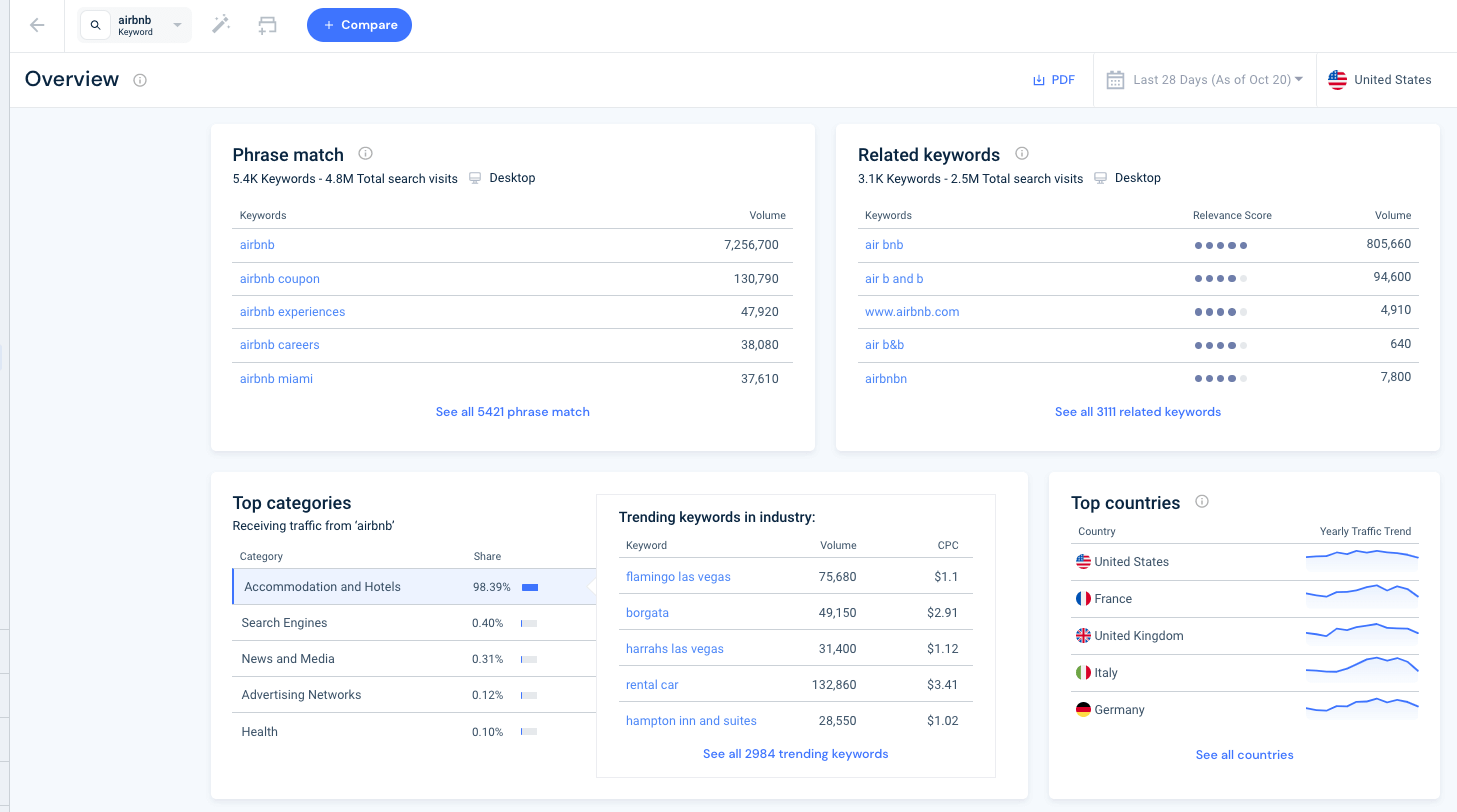
If you operate in a highly specific industry sector or want to hone in on a smaller niche, you can create custom industries. Just think, you can monitor, track, and benchmark traffic to a selected group of websites. Instead of a small selection of five URLs, you can add up to 300 and stay on top of their action.
Get keywords for your industry sector
Finding industry-related keywords helps you get more focused in your keyword research more quickly. Engaging in extended research for a keyword only to discover at the end of the process that this keyword is prevalent in an industry sector unrelated to what you offer is frustrating and a waste of time.
With the Similarweb keywords by industry function, you can avoid doing unnecessary work. At the same time, you discover details about your competitors, search trends, and how audiences search.
How do I find popular keywords in my industry?
The easiest way is to use a keyword research tool that offers a ‘keywords by industry’ function, like Similarweb. Simply select your industry and get the most-searched keywords in that market.
What are industry keywords?
Industry keywords are search terms and phrases that belong to a specific industry or are characteristic of an industry. This could be products, professional language, or otherwise related terms.
Why are industry-specific keywords valuable for SEO?
Industry keywords help you hone in on your target audience . When optimizing for keywords that are unique or particularly popular in your industry, you increase your chances of reaching your potential customers.
Related Posts

Copywriting Psychology: 7 Ways to Make Your Content Stick

The Best SEO Tools in 2024

Most Searched Things on Google in 2024: The Complete List

Back to Basics: Sitemaps for SEO

Marketing OKRs: How to Stay Focused and Hit Your Targets

Discover the Most Searched Long-Tail Travel Keywords in 2024
According to research , 64% of searches include four or more words. Commonly, younger websites and those with a limited budget find it difficult to fight for higher positions in the SERP. In such cases, it makes sense to pay attention to long-tail (LT) search queries (most of the time – but not necessarily – over three words) as competition is lower for these terms, which will lead to more traffic growth. On this page, you will learn how to search for long-tail keywords and find a useful list of the most frequently searched travel keywords in the UK and USA.

What Are Long-Tail Keywords and Why Do You Need Them?
Long-tail keywords are search queries consisting of several words that are often used by visitors to look for detailed information, especially when they are ready to make a purchase, or via voice search.

Long-tail keywords usually have a low search volume in contrast to short-tail keywords, which are usually comprised of one or two words. However, due to being specific, long-tail keywords often have a higher conversion rate.
For example, if you are promoting tours and activities in London, you will most likely try to rank for keywords like “tours in London” or “best tours in London” to drive as much traffic as possible to your website. However, ranking well for those keywords will be pretty competitive in contrast to a long-tail keyword, such as “best food tours in the south of London”, which will draw more relevant visitors and will be easier to rank for, resulting in higher conversions.
For webmasters, low competition is the key benefit of long-tail keywords. However, this is not the only benefit.
A user entering a LT query into a search engine usually has a specific idea of what they are looking for. In many cases, these users are closer to making a purchase then visitors using short queries. Promoting your website or blog with long-tail keywords is low-cost and easy because there is:
- Less effort needed to advance LT queries, as you will not need an in-depth analysis of semantics;
- Low competition, thanks to specific requests;
- Low budget for contextual advertising as, along with good content, LT keywords will sooner or later help your site reach the top;
- Usually, no need to buy links, as internal optimization will be enough;
- Traffic growth, as the more pages the site has, the more entry points for potential customers and users there are. (You will need to create multiple pages with LT keywords.)
Finally, thanks to such keywords, you can fulfill narrow queries from users by offering highly useful content.
How to Find Long-Tail Keywords
There are two main ways to search: (1) using the most searched words on Google and (2) through feature articles and sites.
The first method works via Google Suggest. You begin to enter a request and the system displays possible endings to your search. For a travel-related search, you will see a series of the most searched travel keywords with a low tail. For instance, in the below example, we begin by entering “holiday in…” to see the following options:
You can also use the tips from Related Search at the bottom of the search page for more highly targeted top travel keywords.
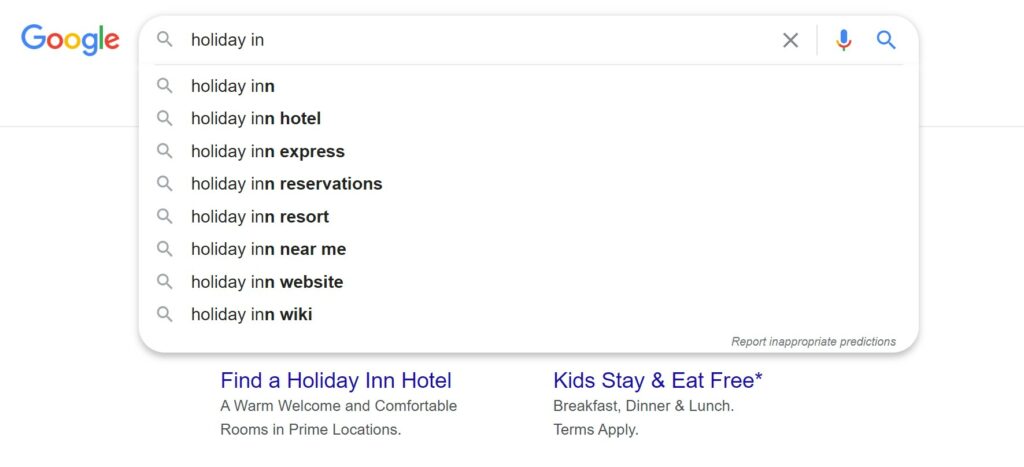
The third feature of the Google search engine is “how to” questions and similar options. For example, if you ask the system how to travel cheaply, you will be presented with similar questions in the “People also search for” section. You can use these suggestions in their entirety or generate LT keywords based on them:

The next option for finding the best keywords is to use ideas from question-answer sites or thematic sites. In the first case, go to the selected QA site (for example: Quora ) and enter the required keywords for travel and tourism, such as “last minute vacation”. View similar questions on the topic, which will be your LT queries.
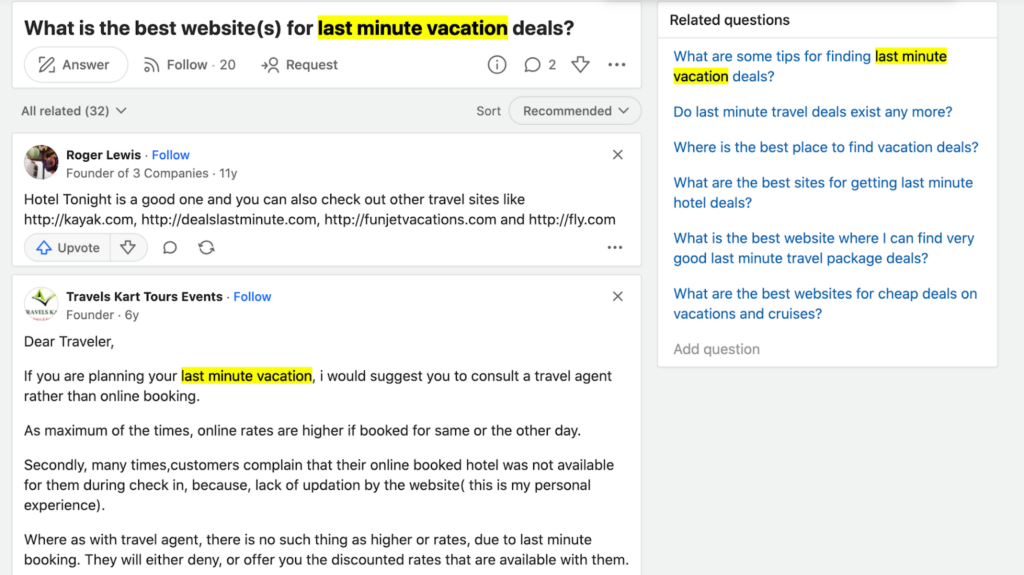
The next option is to read various topic-based articles (especially travel guides ) and search for the most used travel keywords. This will give you an idea what keywords you need to use if you want to rank high on search results for the same topic. Make sure to note as many gaps as possible in the content so you can create an even better version.
The essence of the above methods is to give users the answers to specific questions that may interest them. If, after reading the article, you still have reasonable questions, then you can safely write your article under such a request. If your blog is useful, you can attract more traffic and money. Thus, one of the ways to earn money from website traffic can be solved.
Discovering Long-Tail Travel Keywords for Your Blog
So, how can you find the best travel keywords for your blog? First, you need to consider your blog’s niche, audience, the search intent that may lead users to your posts, and so on. To learn more about search intent, watch this video from Travelpayouts Academy .
Start with your blog’s niche and topic. For example, let’s say your blog focuses on luxury travel to tropical destinations. Writing about general travel topics, such as “how to pack for a trip” or “the top 10 tourist attractions in Europe” may not draw readers with an intent to purchase. However, by narrowing your niche and focusing on specific topics related to luxury travel to tropical destinations, you can attract readers who are more likely to be interested in your content and who may potentially become customers.
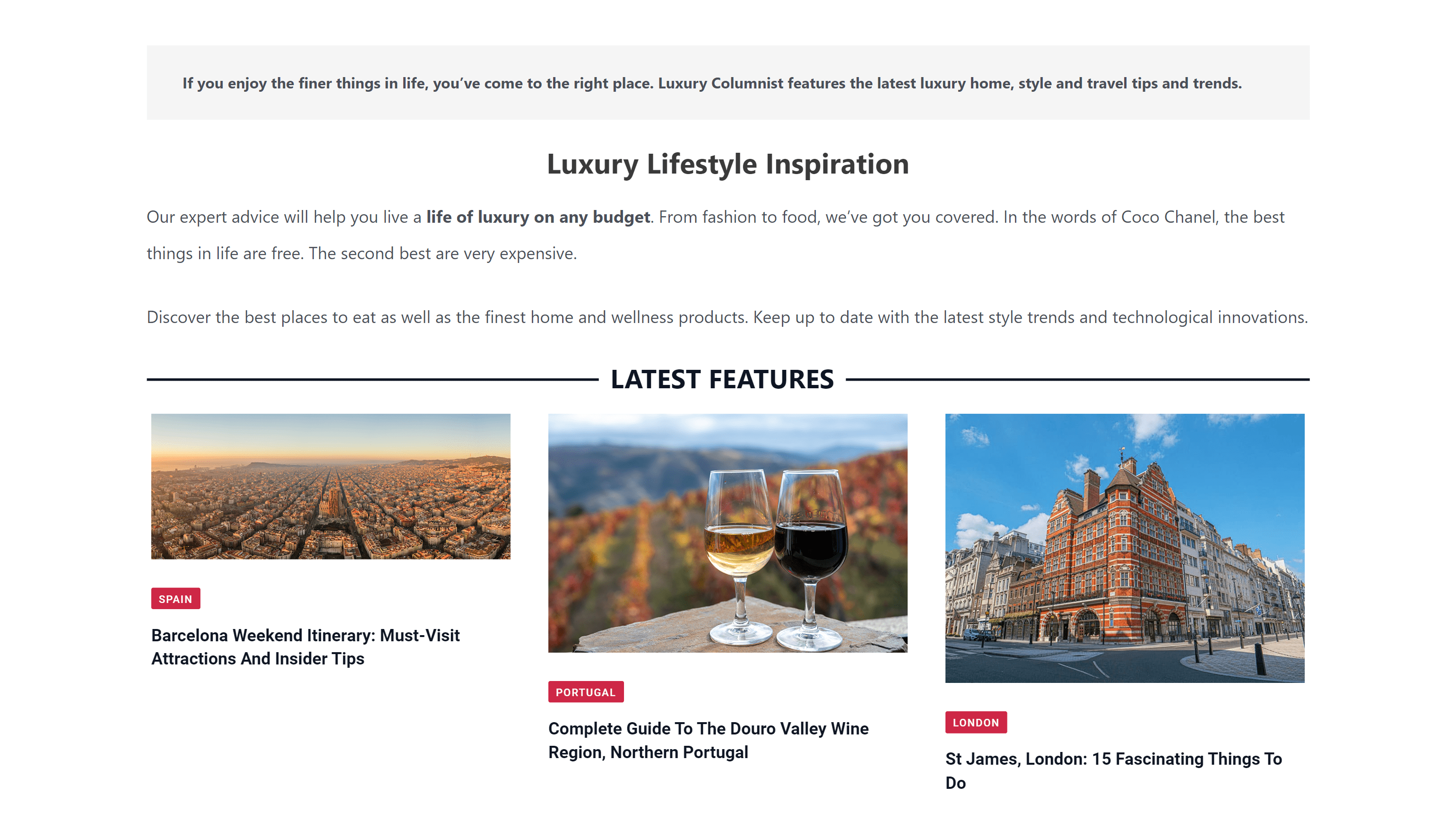
Using long-tail travel keywords can also be effective when it comes to attracting users that are interested in your narrow topic. For instance, instead of using a broad keyword like “tropical vacations”, you could use long-tail keywords like “luxury beach resorts in the Caribbean” or “best time to visit Hawaii for whale watching”. Both of these keywords are more specific and target a smaller, more niche audience, but they are also more likely to attract readers with an intent to purchase, who are interested in the exact topic you’re writing about. By using these kinds of targeted keywords, you can build authority in your niche and grow an engaged and loyal community of readers.
Analyze your audience as well. Let’s say you have a travel blog that focuses on adventure travel for young adults. Using tools such as Google Analytics , you can check which keywords your audience uses to discover your posts. For example, you might find that most of your audience is searching for “backpacking in Southeast Asia” or “adventure travel for solo travelers”. By optimizing your corresponding posts with these keywords, you can make them even more discoverable to your audience.
Google Analytics will also help you understand your audience’s demographics, interests, and behaviors so you can tailor content to them by using the appropriate keywords .
Top 100 Most Frequently Searched Long-Tail Travel Keywords in the UK and USA
To make it easier for you to start using LT queries, we have provided a list of most frequently searched travel keywords in the UK and USA. Based on these terms, you can generate your own keywords and further develop your blog.
- low cost flights from london to lname
- direct flights to las vegas from manchester
- direct flights to seville from manchester or liverpool
- is it cheaper to book flights online or with a travel agent
- cheap flights – book cheap flights to europe with ryanair
- london air fare ,london airfare ,flight to london ,london flights ,flights to london
- how can i get super cheap flights
- flights from isle of man to manchester
- cheap flights to dar-es-salaam
- cheap flights to los angeles from london
- can you cancel ryanair flights within 24 hours
- do i need a passport for internal uk flights
- pia flights from islamabad to manchester today
- flights to the isle of man from liverpool
- cheap flights to harare from london heathrow
- flights from isle of man to london
- flights from new york to las vegas
- how to get cheap flights to orlando
- cheap flights from london to new york
- cheap flights and hotels to new york
- direct flights to new york from birmingham
- flights and hotels to new york city
- first choice discount code 2022 holidays
- last minute dog friendly caravan holidays
- tui holidays to puerto de la cruz
- singles holidays uk for over 50’s
- how many holidays do you accrue a month
- last minute villa holidays with flights
- cheap caravan holidays uk last minute
- can i book jet2 holidays by phone
- cheap holidays in august all inclusive
- travel republic holidays puerto del carmen
- shearings coach holidays pick up points
- last minute coach holidays in england
- things to do in summer holidays
- all inclusive coach holidays to spain
- last minute holidays from bristol to anywhere
- where is best for all inclusive holidays
- cheap holidays in august in uk
- when can you book 2022 holidays
- package holidays to jersey by air
- how much is a 1 day travel card
- is it safe to travel to turkey
- is it safe to travel to egypt
- can you travel with a passport that expires in 2 months
- how much is a day travel card
- which is the best travel insurance company
- best prepaid travel card for europe
- frequently asked questions about time travel
- who can travel to usa without visa
- travel insurance for pre existing medical conditions
- can i travel if my passport expires in 3 months
- who are the best travel insurance companies
- travel insurance with pre existing conditions
- is it safe to travel to cyprus
- how long do i need on my passport to travel to spain
- best vacations for single guys to get laid
- best family vacations in the united states
- cheap all inclusive vacations from new york
- caribbean vacations all inclusive resorts adults only
- cheap all inclusive vacations for family of 5
- all inclusive vacations in montego bay jamaica
- cheap vacations from new york to caribbean
- how much did bush spend on vacations
- best deals on all inclusive caribbean vacations
- best beaches on the east coast for family vacations
- how to spend time in summer vacations
- who has the cheapest all inclusive vacations
- best vacations for single men over 40
- best beach vacations in august/september
- insight vacations best of spain and portugal
- best time to buy all inclusive vacations
- cheap all inclusive vacations for one person
- best places for family vacations in florida
How to Find Long-Tail Keywords for Your Blog
Promotion using LT queries is a great way to entice customers, who are ready to make a purchase or share useful information, to your site. You can choose from the most frequently searched LT travel keywords using search engines and feature articles.
Most importantly, remember that the audience is looking for useful information. Your goal is to provide users with comprehensive data on the chosen topic when creating and monetizing a travel website . LT keywords will help cater to the needs of the audience and highlight which topics should be disclosed in the article.

How to Find Keywords for Travel and Tourism Websites
David kovacs.
- December 5, 2019
Are you wondering how to find the best keywords for travel and tourism to sky-rocket your rankings and get more travellers reading your travel guides?
When I say travel keyword research, I don’t just mean pulling random words or phrases. I’m talking about finding keywords that you can use today, and bring in more traffic from Google.
In this post I’m going to share everything you need to; find keywords for your website, how to use them and best of all – how to bring in more traffic! Fair enough?
Let’s get started.

What is keyword research?
What on earth is keyword research? I know, it sounds a little scientific (it’s not) – this is the most important part to finding your keywords for travel and tourism. For any search engine optimiser (SEO) expert, this is one of the most important parts of any campaign.
But where do you start?
Don’t worry. Let’s break it down – firstly looking at the basics. Over 2.3 billion searches are conducted every minute on Google ; which is why you have to enrich your content with relevant keywords. This is achieved by looking for any words or phrases that are relevant to your content.
It’s like aiming in the dark – without keyword research. You could write an amazing article, but if the search engines don’t see it has relevant – well, you won’t be getting any traffic!
So, we understand how it helps – what next?
The main goal of keyword research is to find out what your target market is searching for and create the content around them searches. But there’s more, this is where it gets interesting! There are lots of places to conduct keyword research, for example;
- Keyword tools (I’m going to share some of the best ones with you)
- Search engine results pages (SERPs)
- Competitors
Which keywords to target?
Choosing keywords is not easy – but good news! I’m going to share how to pick the right keywords for travel and tourism.
One of the best pieces of advice I can give is to target long-tail keywords. What are those you may be thinking? They’re keywords that are easier to rank your website higher in Google.
Let’s look at a simple example: Say you wanted to create a travel guide on “Bali”. You know by now that this is a difficult keyword to target. As a result, you’d create a long-tail keyword such as “Bali travel tips for summer”. Then, you have a lot more chance of getting for that keyword.
Think about it: lonely planet or TripAdvisor will probably be competing for the keyword “Bali” – so why battle it out? Think about it – you have a much easier chance to rank for long-tail keywords. Let the big boys battle it out – and you sneak in to take all them long-tail keywords from under their nose.
In my experience: you should target long-tail keywords and start bringing in traffic. Then, once you have some authority, you can start targeting the short-tail keywords.
There are 1000 keywords for travel and tourism – you just need to find the best ones to target. The key ingredient is to find long-tail keywords with a high search volume.
Wait, there’s another part to this – keyword intent.
Keyword intent
Keyword intent is important – and one of the ingredients often missed. Also, this needs to be researched when doing paid search.
So what does keyword intent mean you probably wondering? To put it simply; it’s the intention the user has with the search they’re querying. Let’s look at the different types of intents;
- Informational – searches performed for an answer to a question or to learn something
- Navigational – searches performed to locate a specific website
- Transactional – searches performed to buy something such as new trainers
You must understand these intents, then you know how to best optimise your content. And we don’t stop there – let’s look at some of the intents which mean a searcher is ready to buy;
- Free shipping
When a searcher uses these keywords, they’re ready to buy a product. As a result, if you want to sell a product, target these keywords.
How to check the authority of a competitor’s website?
This part is useful so stick with me! We’re now looking at the domain authority (DA) of a website, with the free Moz DA tool .
So what is DA?
It’s a metric created by MOZ. This metric is used to predict a website’s chance of ranking for a certain keyword. That’s not all! The DA ranges from 0-100. This means; the better the authority, the more chance it has of ranking. Also, a higher DA helps pages within your website rank higher – your homepage is generally the strongest page within your website.
Fun fact – Lonely Planet’s DA is 92 – you can see why this website ranks so easily for the most commonly searched travel keyword.
What is a good DA?
There’s no simple answer to this question – but I will give you the best answer possible!
You target DA will depend on the niche you’re targeting. If you’re writing travel guides on easy keywords (not many websites are targeting), then a DA of 15-30 might be acceptable. On the other hand, if you’re targeting more difficult keywords, then you need a higher DA.
Let’s look at an example using the MOZ DA checker tool.
If we search “things to do in Ubud”, we can see the following results;

There are three different DA scores for the top results;
You see, this is a difficult keyword to rank for. Think about it, Google trusts these high DA scores. Therefore, if they produce quality content, then they will more than likely rank high.
Now I’m not saying you should discard targeting keywords that may seem difficult – I’m trying to help you rank your site, and get more traffic. Do your keyword research and look at the SERPs to see which websites are targeting that keyword.
Okay, so we understand what DA is, but how do you improve it? This is a whole new article itself. However, we will go through the fundamentals of getting websites linking to yours;
- You need to create amazing content that provides good information for your target market, Other bloggers and websites will always link to useful articles. Bonus tip – Use statistics and infographics in your posts. These are bulletproof ways to get new links.
- Plugin is competitors URL into Ubersuggest and discover where they’re getting their links from. Then, send a friendly email to the website that’s pointing to theirs, mentioning your new post and would they be interested in providing a link to your article.
So, there’s how to improve your DA – so you can rank for travel keywords easier. But there’s one more thing, your website’s age . The older the website, the more trust it will get (if actively improved). A new website will usually struggle to get traffic from Google for the first 3-6 month (market dependant).
Targeting LSI keywords
There term Latent semantic indexing (LSI) keywords are words or phrases that share relevance with the target keyword.
Let’s look at an example to make it easier to understand.
If “things to do in New York” was your keyword, then possible LSI keywords would be;
- Activities in New York
- Things to see in New York
- Places to see in New York
- Things to do at night in New York
You get the point.
The purpose of LSI keywords is to add more relevance to a post and help Google understand your content.
How to find LSI keywords?
The trick here is to not just focus on synonyms of your target keyword. I like to go in-depth on related phrases and surrounding topics. One trick I like to use is Google related searches. This gives you a list of useful LSI keywords – and if Google’s telling them they’re relayed – Give Google what they want. As a result, using LSI travel keywords will give your content a massive boost in the eyes of Google.
I bet you’re excited to get stuck into these keywords – and I have a great LSI tool for you in this next section.

Tools for Keywords for Travel and Tourism Websites
This is crazy: there are free tools for you to find keywords for travel and tourism. Yes, that’s right! There are free SEO tools that will show you what keywords to target – and which to avoid.
There are paid SEO tools, however, why pay when you can use them for free?
Are you ready to see some of the best free tools to find your travel keywords? Let’s take a look.
We have looked at LSI keywords, so now it’s time to find them – enter the free LSI graph . You just simply plugin a keyword, then this SEO tool will provide you with a list of related keywords and phrases.
Now you need to take the best keywords that you can fit into your content without it looking spammy. You need to see if you can create headers out of these phrases – or will they naturally just fit into the flow of your content.
As you start plugging them into your content, you will soon realise how valuable the LSI keywords are.

Google Keyword Planner
This is one of the best tools when searching for the most commonly searched travel words. And, it’s the most accurate for Google searches. I know you will love this tool once you start to use it – no doubt about that!
The keywords provided here comes directly from Google themselves. But wait there’s more, Google keyword planner tells you;
- Average monthly searches
- Competition
- Suggested bid (if you’re using paid search
Boom! Plenty of juicy information.
To use this SEO keyword planner; you just need to sign up to an account with Google. Then, you’re free to start using the tool. You simply just plug in a keyword, and you will be given all the information available by Google.

Ubersuggest
So far, we now understand how to find keywords – that’s going to bring you plenty of traffic. Now, it’s time to discover what your competitors are doing best – and steal their keywords. SEO is the only time when stealing is right. And fun. Enter Ubersuggest; one of the best free SEO tools – and one every marketer loves!
Ubersuggest work by taking a web address (which you provide), then tells you a lot of useful information such as;
- A competitor’s backlinks (other websites pointing to there website)
- Their domain authority
- Keywords they rank for
- How much traffic a website receives
- Keyword ideas
And plenty more!
This is the best free SEO tool to see what travel keywords your competitors are ranking for. Then, you can use all this information to create better content.
It’s crazy how much info you’re given for free!

Implementing your Keywords
Let’s get to work with your new travel keywords. We need to craft content around that attracts Google, and keeps the reader engaged with your content.
Making engaging content is where a lot of SEO consultants fail. You can’t just stuff your page with keywords and expect the job done. You need your content to be conversational – just like it feels you and I are having a conversation – fair enough?
Okay, let’s look at a strategy for your new keywords;
- As mentioned, you need to create high-quality and interesting-to-read blog posts. These will keep a reader on your site longer, build trust and increase rankings.
- Strategically use the long-tail keywords we spoke about. These will bring in visitors desperate to see your travel articles.
- Do proper onsite optimisation. Don’t worry this part sounds fancy but it’s easy. You need to link to other pages on your website that’s relevant. This will keep visitors on your site for longer, and also help Google read your pages. Want to know the best part? Doing this simple tactic will help with your rankings.
- Click-through rate (CTR) is an important ranking factor. Therefore, use catchy titles and meta descriptions; both of these are clickbait on the Google page. You want to draw the eyes of a searcher, and entice them to click your awesome travel guide. These tags are not big ranking factors – but the CTR is.
By now you can the importance of keyword research – and how it benefits your website. Cleverly utilising Keywords for Travel and Tourism Websites is a sure way to bring in more traffic.
I’m glad you now have the information and tools to get started with your travel keyword research.
Grow Your Travel Business with SEO
All you need is to contact us and get started!
8 thoughts on “How to Find Keywords for Travel and Tourism Websites”
Dear David, your info is so useful, authentic and generous. Thank you a lot for the info and for the insight.
Thanks for the comment, let me know if you have questions!
I really enjoyed reading your article. You wrote in an impossibly beautiful manner. I felt like I wasn’t reading the text, rather you were talking to me.
It’s been a year since I created a travel website and is fighting for rankings. I wish I could get some more direction from you.
Sincere thanks.
Thank you Haque! Send us an email [email protected] and we will help you. See you there!
Hey, your article is awesome…
Hello David, I am in the process of creating my travel blog. Since I am quite digitally challenged your article really was very informative breaking it down to the basics. Thank you.
Thank you for the comment!
Leave a Comment Cancel Reply
Your email address will not be published. Required fields are marked *
How to Find the Best Tourism Keywords by Geography
By Kyla Steeves
Share this article:
- Facebook icon
- LinkedIn icon
- Twitter icon

When it comes to marketing your tours or activities, one of the most important facets is search engine optimization (SEO). As the biggest driver for organic traffic, SEO can help you rank for popular travel and tourism keywords in your destination — whether in Google Search, Google Maps, or other online directories — to capture interested travelers and locals alike.
While travel related keywords are very common, what makes them highly valuable is the intention behind them. Typically, the traveler has an end goal; they already know what they want to do, they’re just looking to book with the right tour operator.
For example, let’s say someone wants to go wine tasting in Italy for a bachelorette trip. Instead of entering “best bachelorette party ideas for big groups” into Google, they might try something like, “wine tour Venice Italy.” Understand the difference?
You see, they’re primed to book already. After weeks of travel planning, they’ve had time to look up ideas, and now, just need to find a winery tour operator to host the party. But sometimes, people make last-minute travel plans while in-destination; it’s almost instinctive. “What do you want to do today? Go kayaking? Gotcha. Looking up a place to rent kayaks right now.”
And more often than not, they will go with a business in Google’s local snack pack (see image below) or the first page of results. Usually, that’s because they like what they see right away, are in a hurry, assume the best choices are in the top positions, or the reason is a combination of all three.
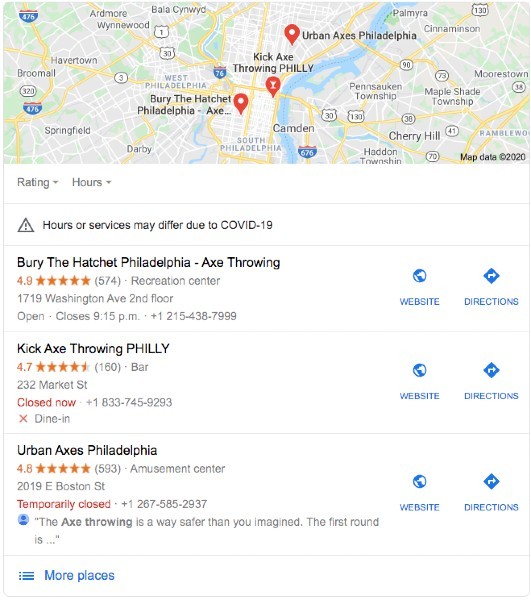
When done right, SEO can help you snag those higher rankings and increase your chances of capturing high-converting leads at such a crucial time. There are lots of advanced travel SEO tactics, but we’re going to start by going over finding the best tourism keywords, as they should become the basis for all of your optimization efforts.
What are tourism keywords?
Tourism keywords are the search terms or phrases people use to find things to do in your destination. They normally contain a niche descriptor and a geographical modifier, following a structure that tends to look like this:
Niche descriptor + Geographical modifier = tourism keyword
whale watching tour + Victoria BC = whale watching tour Victoria BC
In terms of SEO, you can add relevant travel and tourism keywords to your website content, Tripadvisor listing, and even your YouTube channel, to tell search engines (mostly Google) and other directories that your business offers what the searcher is specifically looking for.
But of course, there isn’t a one-size-fits-all for travel keywords. Every searcher is unique, and so is their go-to phrasing, which means there could be hundreds of variations for the same search intent.
For example, someone might replace the location with term near me instead :
escape rooms + near me = escape rooms near me
Another searcher might throw in modifiers like best, top, cheapest :
best + mountain bike rentals + Virgin Utah = best mountain bike rentals Virgin Utah
And finally, someone might switch up the order altogether:
surfing + Bondi Beach + lessons = surfing Bondi Beach lessons
So, how do you know what travel and tourism keywords to use? Which ones are the most popular to get the most clicks? And what competition will you face — do you even have a chance at ranking for them? That’s where local keyword research comes into play.
How to find keywords for tourism website
Without taking the time to research the top travel keywords for your destination, you’re essentially taking a shot in the dark for SEO. If you wouldn’t do that in an axe throwing competition, why would you do that for something that matters as much as your brand’s online visibility?
That said, doing a keyword search by city is a simple process — involving nothing more than brainstorming with online keyword tools — and doesn’t take too long once you get it down pat. The objective is to generate an extensive list of all potential keywords so that you can quickly compare for best use cases. Here are the steps:
1. Create a travel keywords list
First things first, you will want to create a spreadsheet for your keyword ideas to live. That way, you can quickly refer to it whenever you publish new content, like a blog post or web page. Just remember to keep it updated, considering keyword trends change all the time. We’ll get to that soon.
For the most part, your keyword spreadsheet will only need three columns: local keyword, search volume , and competition. But since many keywords, local included, are long-tail keywords — highly specific phrases of three words or more — it’s a good idea to set it up like below to get a better understanding of the structure commonly used:

Long-tail keyword: the full keyword, with or without a geo modifier (location)
Search volume: the average monthly searches for a specific keyword
Competition: the level of competition between advertisers bidding on the keyword — like online travel agents (OTAs)
Prefix: the word(s) that come before the seed keyword
Seed keyword: the industry-related keyword, or better put, the keyword that describes your product — such as bus tour, kayak rentals, lake cabins, or aerial ropes course
Suffix: the word(s) that come after the seed keyword
2. Brainstorm with Google and other keyword tools
One of the best places to begin your local keyword research is Google itself. You might have noticed already that Google will autocomplete your search as soon as you type, make predictions in a dropdown menu, and provide a list of related searches at the bottom of the search engine results page (SERP).
Well, you can actually use these suggestions as a jumping-off point because Google comes up with them based on related and popular keywords for a better search experience. So if you start by entering a few search terms you would use yourself to find your offerings (not brand specific), you will end up finding relevant keywords to add to your spreadsheet.
On top of that, you can find out what queries your guests already use to discover your business with Google Search Console . As long as you have a Google Account, you can enter your domain, then click on Google Search Results under Performance and see what queries get the most clicks and impressions. You can also filter the results on a per-page basis by clicking +New , then Page , and pasting your page URL.
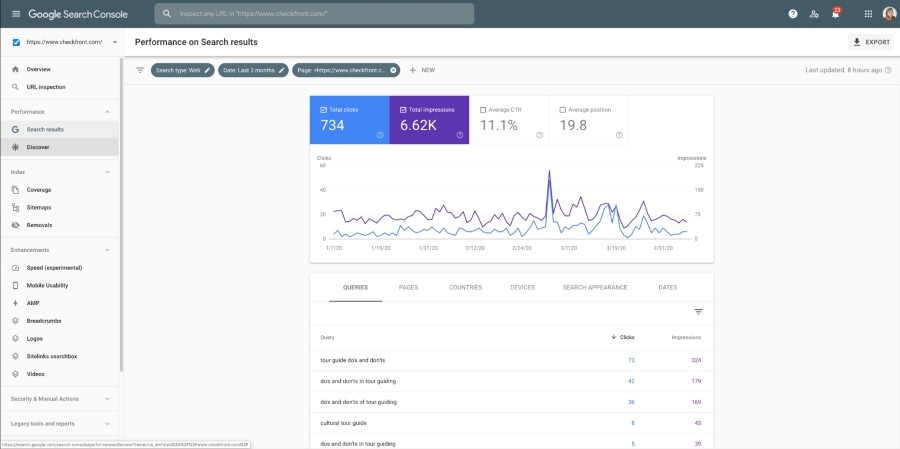
Once you have a list going, you can then turn to an online keyword tool for more insight. There are many options available that come with powerful features and databases — like Ahrefs Keyword Explorer or SEMrush Keyword Magic Tool . However, Google Ads Keyword Planner is free and does a good enough job.
Here’s how to use Google Keyword Planner
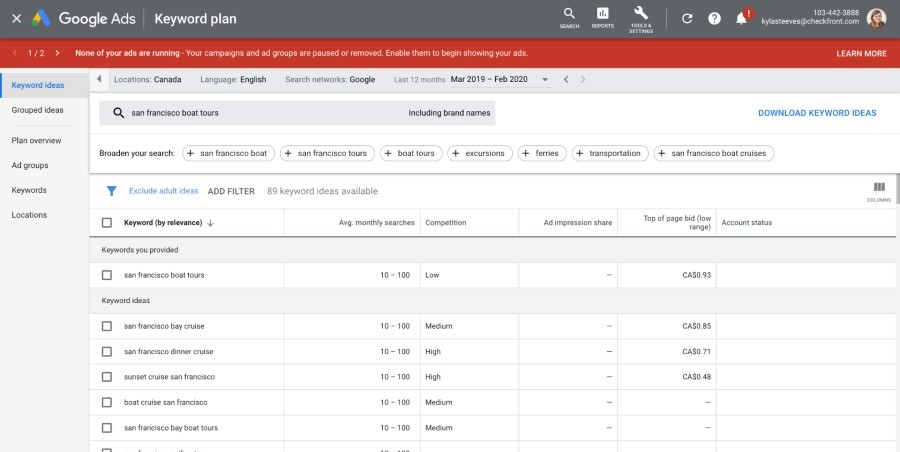
- Access Google Keyword Planner by clicking on Go to Keyword Planner
- Follow the prompts to set up a Google AdWords account. Don’t worry, you won’t have to run an advertising campaign to use the keyword tool.
- Select the box with Discover new keywords
- Copy and paste your keywords separately into the search bar and click Get results. You can broaden the search by using multiple seed keywords, separated by commas.
- Record the average monthly searches and competition for the keyword in your spreadsheet
- Scroll through the keyword ideas and add any more to your list that also apply to your business
Now, if you run your tourism operation in a location that doesn’t have a high population, you might not see any results because there just isn’t enough data available. If that’s the case, try replacing your geo modifier with another city nearby, and then make the switch back in your spreadsheet.
For example, nothing much comes up in Keyword Planner for Half Moon Bay boat tours, even though there are over 7 million results in Google Search. But if we use San Francisco instead, which is 29.4 miles away, we get 89 keyword recommendations that we can adapt for Half Moon Bay keywords.
3. Choose the top keywords for tourism
After you feel like your keyword list is long enough, you can go ahead and choose your top picks. And the easiest way to do this is by sorting the search volume column from lowest to highest.

But wait, shouldn’t it be the other way around? Don’t you want to target travel related keywords with the highest search volume? Normally, yes. However, as a small business, you have a better chance of ranking for low volume keywords — around the 10-100 range.
That’s because high volume keywords are highly competitive. It only makes sense; popular keywords attract more competition because they drive more search traffic. And unfortunately, larger companies tend to earn these rankings because they’ve already built the SEO-strength for an extra boost.
Keep in mind though, while low volume keywords get less search traffic, they usually have higher conversion value because they are more specific. So targeting them is actually a strategic move on your part, and as you improve your SEO overall, you can eventually go after the higher volume keywords, too.
Also, Google Trends is another useful and free tool for choosing the best keywords. You can compare up to 5 similar keywords and their popularity overtime, so that you know which ones to focus on more. Note: If you don’t see anything come up, try filtering the results by your country instead of worldwide.
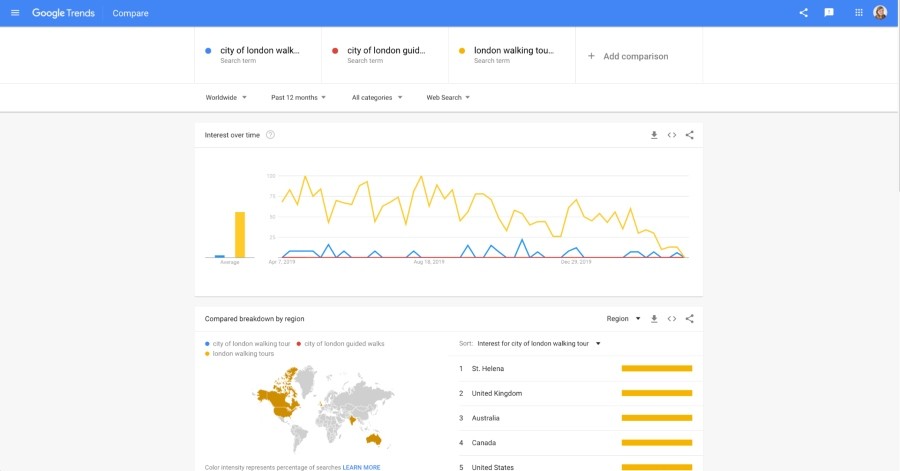
4. Repeat the process for each tour
If you have multiple products, you will want to find travel related keywords for all of them. For example, let’s say you offer a city bike tour, but also a brewery bike tour. Although both fall in the same category and have the same seed keyword (bike tour), a person looking to book a city bike tour nearby won’t use the same search term as they would for the latter.
Just add a new sheet in your keyword spreadsheet for each of your products and repeat the above steps. The same goes for if you have multiple locations — but for better organization, you may want an entirely new spreadsheet for each site and its products.
Where to put travel and tourism keywords
For the best SEO practice, you should have a different keyword theme for each page on your website. Since your homepage will likely rank best for your brand name, you can optimize your booking page(s) with your travel keywords. Besides, that’s where it makes the most sense to direct traffic, considering most local searches have a transactional intention.
Again, if you have multiple locations, categories, and products, you should consider having a separate booking page for each. That way, you can really target those tourism keywords by giving Google and other search engines a clear idea of what every booking page is specifically about.
With the previous example, you would optimize your category booking page with the local seed keyword, bike tour Dublin, and then list all of your bike tours with call-to-action buttons to their separate booking page. Doing this will also improve your internal linking structure for better overall SEO. From there, every product booking page could then target long-tail keywords.
Here all the places to put travel and tourism keywords on your booking page(s):
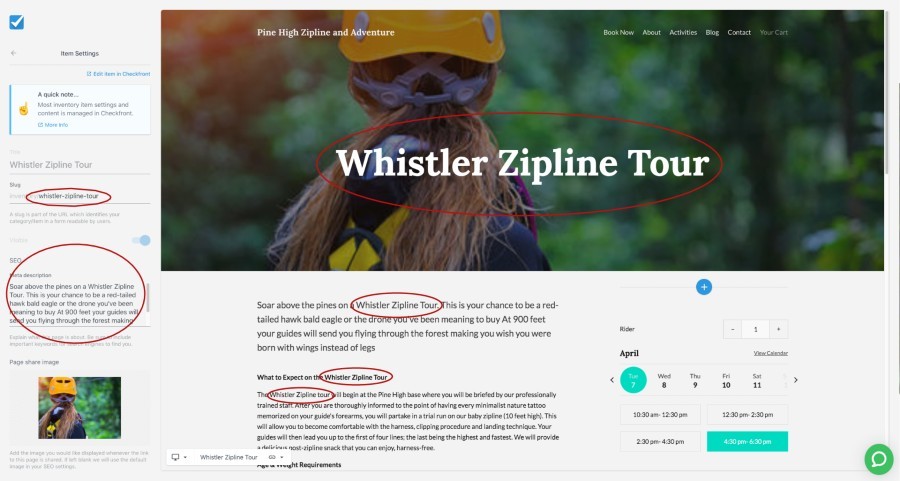
- Page title: also known as a title tag, it’s an HTML element that specifies the title of your booking page, which appears in the search results and the browser window
- Meta-description: a snippet of around 160 characters that also displays in the SERPs and describes what your booking page is about
- Heading: the main title at the start of your booking page with the H1 tag
- Sub-headings: the section headings of your booking page with an H2, H3, or H4 tag — the best places for your keyword synonyms
- Body text: the main content of your booking page, usually where you have paragraph sections
- Item name: the name of one of your products in tours, activities, accommodation or rentals
- Item description: the description for tours and travel , which includes essential details
- URL slug: the part of the URL that comes after your primary domain that identifies your booking page — like pinehighzipline.com/zipline-tours
- Image alt-text: a description of the image that gets read-aloud for the visually impaired with screen readers or appears when the picture doesn’t load. It should be short, but descriptive
- Image filename: a sneaky place to optimize your content, which can also help your image appear in Google Images, like saving an image as london-ghost-walking-tour.jpg rather than IMG-12.jpg.
It’s easy to get carried away when adding keywords to travel websites. What you want to avoid is keyword stuffing, which is an old blackhat SEO tactic that Google penalizes today. Instead, you should focus on working your travel and tourism keywords naturally into your page content and switching up your keyword usage with the various synonyms in your local keyword list.
Understandably, it might feel unnatural to put your location everywhere, especially in the headings, sub-headings, and item names. And that’s alright; you don’t have to, seeing as you can also put your NAP on every page for optimal SEO.
Don’t forget about your NAP
Your NAP is your business info, which includes your Name, Address, and Phone Number. On your website, the best place for your NAP is in the footer. You should put your NAP somewhere on every page, but if you have multiple locations, make sure to assign the appropriate address for that specific booking page.
One of the most common SEO problems is neglecting to keep your NAP consistent and up-to-date across the board, from your website to your Google My Business listing, even on your Facebook Business Page. Maintaining consistency in your citations signals to Google that you are a legitimate business and care about giving your guests accurate information.
Other places for tourism keywords
Tourism keywords don’t just belong on your website. As I mentioned earlier, you can optimize your local listings and social media profiles with them as well. But we’ll get to that more in the second chapter of the Local Marketing Guide for Experience Providers. Get your free copy below!
Ready to target travelers who are nearby?

Get 52 pages of local marketing tips
And learn all about what you can do to stand out in your community and local search results.
Related Articles

How to write ATV tour descriptions that drive bookings (with examples)
Learn how to write ATV rental descriptions with SEO-ready language that help you sell more bookings
- Marketing Strategies

Easy & effective pricing tactics for activity and rental operators
Ever wondered why at the movie theatre you’re likely to opt for a Large Popcorn instead of a Small or…
Search Blog
Subscribe to our newsletter.
Get tips and strategies to grow your business and impress your guests.
Blog Categories
- Booking Management
- Business Tips
- Guest Experience
- Operator Highlights
We Cracked the Google Code to get a 700% Jump in Organic Traffic. Secrets Revealed in this Free Webinar
- Top Keywords
- Most Asked Questions
- Most Searched Words
- Top Business Books
- Write For Us

Get the top most searched Keywords in Google
The Most Searched Vacations Travel Keywords Revealed
Vacations travel keywords.
If you are someone who’s been thinking about how to increase bookings and make more sales from your travel website and steady growth of your travel business through SEO, then you have reached the right place.
We at Mondovo can guide you with free vacations travel keywords that are effective in global search volume and CPC, which you can make use of them in optimizing your website, at absolutely FREE of cost.
Tracking and monitoring “Vacations Travel” related keywords is easy and on this page, we bring to you an exhaustive list of top Vacations Travel keywords. We have leveraged the power of Mondovo’s Free Keyword Tool to get you this complete vacations travel keywords list.
A List Of Most Searched Vacations Travel Keywords
Mondovo’s Keyword Research Tool has been designed not only to let users find keywords but to deliver key insights for each keyword so that users, like you, will be able to make sense of what you get and get things done with them.
If you liked this data on Vacations Travel Keywords, then you also might be interested in The Most Asked Questions on Google , The Most Searched Words on Google as well as the 100 Best Books to Read . For other Top Keywords Categories check the links below.
[contact-form-7 id=”1599″ title=”Mondovo.com – World’s 1000 Most Expensive Questions On Google”]
[contact-form-7 id=”1592″ title=”Mondovo.com – Most Expensive Google Keywords”]
[contact-form-7 id=”1531″ title=”Mondovo.com – Can Question Keywords”]
[contact-form-7 id=”1523″ title=”Mondovo.com – Which Question Keywords”]
[contact-form-7 id=”1516″ title=”Mondovo.com – Who Question Keywords”]
[contact-form-7 id=”1496″ title=”Mondovo.com – Why Question Keywords”]
[contact-form-7 id=”1486″ title=”Mondovo.com – What Question Keywords”]
[contact-form-7 id=”1481″ title=”Mondovo.com – When Question Keywords”]
[contact-form-7 id=”1476″ title=”Mondovo.com – Where Question Keywords”]
[contact-form-7 id=”1469″ title=”Mondovo.com – How Question Keywords”]
[contact-form-7 id=”1424″ title=”Mondovo.com – Government Trade Keywords & Question Keywords”]
[contact-form-7 id=”1419″ title=”Mondovo.com – Industrial Goods Keywords & Question Keywords”]
[contact-form-7 id=”1414″ title=”Mondovo.com – Web Hosting Keywords & Question Keywords”]
[contact-form-7 id=”1407″ title=”Mondovo.com – Virtual Server Hosting Keywords & Question Keywords”]
[contact-form-7 id=”1401″ title=”Mondovo.com – Shopping Cart Keywords & Question Keywords”]
[contact-form-7 id=”1397″ title=”Mondovo.com – Semiconductors Keywords & Question Keywords”]
[contact-form-7 id=”1392″ title=”Mondovo.com – Online Stores Keywords & Question Keywords”]
[contact-form-7 id=”1385″ title=”Mondovo.com – Online Payment Keywords & Question Keywords”]
[contact-form-7 id=”1380″ title=”Mondovo.com – Business Travel Keywords & Question Keywords”]
[contact-form-7 id=”1374″ title=”Mondovo.com – Home Based Business Keywords & Question Keywords”]
[contact-form-7 id=”1367″ title=”Mondovo.com – Diet Keywords & Question Keywords”]
[contact-form-7 id=”1361″ title=”Mondovo.com – Jobs Keywords & Question Keywords”]
[contact-form-7 id=”1353″ title=”Mondovo.com – Shoes Keywords & Question Keywords”]
[contact-form-7 id=”1348″ title=”Mondovo.com – Gardening Keywords & Question Keywords”]
[contact-form-7 id=”1342″ title=”Mondovo.com – Electronics Keywords & Question Keywords”]
[contact-form-7 id=”1336″ title=”Mondovo.com – Casino Keywords & Question Keywords”]
[contact-form-7 id=”1329″ title=”Mondovo.com – Home Improvement Keywords & Question Keywords”]
[contact-form-7 id=”1323″ title=”Mondovo.com – Biotechnology Keywords & Question Keywords”]
[contact-form-7 id=”1317″ title=”Mondovo.com – Business Management Keywords & Question Keywords”]
[contact-form-7 id=”1304″ title=”Mondovo.com – Work From Home Keywords & Question Keywords”]
[contact-form-7 id=”1277″ title=”Mondovo.com – Pest Control Keywords & Question Keywords”]
[contact-form-7 id=”1267″ title=”Mondovo.com – Entertainment Keywords & Question Keywords”]
[contact-form-7 id=”1260″ title=”Mondovo.com – Landscaping Keywords & Question Keywords”]
[contact-form-7 id=”1250″ title=”Mondovo.com – Golf Keywords & Question Keywords”]
[contact-form-7 id=”1210″ title=”Mondovo.com – Pharmaceutical Keywords & Question Keywords”]
[contact-form-7 id=”1203″ title=”Mondovo.com – Agriculture Keywords & Question Keywords”]
[contact-form-7 id=”1197″ title=”Mondovo.com – Transportation Keywords & Question Keywords”]
[contact-form-7 id=”1190″ title=”Mondovo.com – Startup Keywords & Question Keywords”]
[contact-form-7 id=”1181″ title=”Mondovo.com – B2B Keywords & Question Keywords_copy”]
[contact-form-7 id=”1176″ title=”Mondovo.com – Email Keywords & Question Keywords”]
[contact-form-7 id=”1159″ title=”Mondovo.com – Coffee Keywords & Question Keywords”]
[contact-form-7 id=”1144″ title=”Mondovo.com – Mortgage Keywords & Question Keywords”]
[contact-form-7 id=”1137″ title=”Mondovo.com – Web Development Keywords & Question Keywords”]
[contact-form-7 id=”1132″ title=”Mondovo.com – Forex Keywords & Question Keywords”]
[contact-form-7 id=”1126″ title=”Mondovo.com – Nutrition Keywords & Question Keywords”]
[contact-form-7 id=”1109″ title=”Mondovo.com – Health Care Keywords & Question Keywords”]
[contact-form-7 id=”1095″ title=”Mondovo.com – Hotel Keywords & Question Keywords”]
[contact-form-7 id=”1084″ title=”Mondovo.com – Dating Keywords & Question Keywords”]
[contact-form-7 id=”1078″ title=”Mondovo.com – Software Keywords & Question Keywords”]
[contact-form-7 id=”1069″ title=”Mondovo.com – Restaurants Keywords & Question Keywords”]
[contact-form-7 id=”1064″ title=”Mondovo.com – Internet Keywords & Question Keywords”]
[contact-form-7 id=”1058″ title=”Mondovo.com – Law Keywords & Question Keywords”]
[contact-form-7 id=”1052″ title=”Mondovo.com – Legal Keywords & Question Keywords”]
[contact-form-7 id=”1046″ title=”Mondovo.com – Jewelry Keywords & Question Keywords”]
[contact-form-7 id=”1040″ title=”Mondovo.com – Retail Keywords & Question Keywords”]
[contact-form-7 id=”1034″ title=”Mondovo.com – Energy Keywords & Question Keywords”]
[contact-form-7 id=”1027″ title=”Mondovo.com – Human Resources Keywords & Question Keywords”]
[contact-form-7 id=”1015″ title=”Mondovo.com – Plumbing Keywords & Question Keywords”]
[contact-form-7 id=”1009″ title=”Mondovo.com – Management Keywords & Question Keywords”]
[contact-form-7 id=”1003″ title=”Mondovo.com – Web Design Keywords & Question Keywords”]
[contact-form-7 id=”997″ title=”Mondovo.com – Automobile Keywords & Question Keywords”]
[contact-form-7 id=”989″ title=”Mondovo.com – Environmental Keywords & Question Keywords”]
[contact-form-7 id=”983″ title=”Mondovo.com – Construction Keywords & Question Keywords”]
[contact-form-7 id=”949″ title=”Mondovo.com – Advertisement Keywords & Question Keywords”]
[contact-form-7 id=”930″ title=”Mondovo.com – Weight Loss Keywords & Question Keywords”]
[contact-form-7 id=”913″ title=”Mondovo.com – Technology Keywords & Question Keywords”]
[contact-form-7 id=”896″ title=”Mondovo.com – Ecommerce Keywords & Question Keywords”]
[contact-form-7 id=”884″ title=”Mondovo.com – Financial Services Keywords & Question Keywords”]
[contact-form-7 id=”876″ title=”Mondovo.com – Acne Keywords & Question Keywords”]
[contact-form-7 id=”870″ title=”Mondovo.com – Debt Keywords & Question Keywords”]
[contact-form-7 id=”861″ title=”Mondovo.com – Accounting Keywords & Question Keywords”]
[contact-form-7 id=”854″ title=”Mondovo.com – Gift Keywords & Question Keywords”]
[contact-form-7 id=”848″ title=”Mondovo.com – Dog Training Keywords & Question Keywords”]
[contact-form-7 id=”832″ title=”Mondovo.com – Aerospace Keywords & Question Keywords”]
[contact-form-7 id=”841″ title=”Mondovo.com – Auto Insurance Keywords & Question Keywords”]
[contact-form-7 id=”822″ title=”Mondovo.com – Internet Security Keywords & Question Keywords”]
[contact-form-7 id=”816″ title=”Mondovo.com – Online Backup Keywords & Question Keywords”]
[contact-form-7 id=”810″ title=”Mondovo.com – Credit Card Keywords & Question Keywords”]
[contact-form-7 id=”804″ title=”Mondovo.com – Cell Phone Keywords & Question Keywords”]
[contact-form-7 id=”798″ title=”Mondovo.com – Poker Keywords & Question Keywords”]
[contact-form-7 id=”792″ title=”Mondovo.com – Luggage Keywords & Question Keywords”]
[contact-form-7 id=”784″ title=”Mondovo.com – Media Keywords & Question Keywords”]
[contact-form-7 id=”776″ title=”Mondovo.com – iPhone Keywords & Question Keywords”]
[contact-form-7 id=”770″ title=”Mondovo.com – Education Keywords & Question Keywords”]
[contact-form-7 id=”764″ title=”Mondovo.com – Dedicated Server Hosting Keywords & Question Keywords”]
[contact-form-7 id=”758″ title=”Mondovo.com – Office Backup Keywords & Question Keywords”]
[contact-form-7 id=”752″ title=”Mondovo.com – Twitter Keywords & Question Keywords”]
[contact-form-7 id=”744″ title=”Mondovo.com – Fitness Keywords & Question Keywords”]
[contact-form-7 id=”738″ title=”Mondovo.com – Consumer Services Keywords & Question Keywords”]
[contact-form-7 id=”729″ title=”Mondovo.com – Email Hosting Keywords & Question Keywords”]
[contact-form-7 id=”722″ title=”Mondovo.com – Email Software Keywords & Question Keywords”]
[contact-form-7 id=”716″ title=”Mondovo.com – Office Supplies Keywords & Question Keywords”]
[contact-form-7 id=”688″ title=”Mondovo.com – Food & Beverage Keywords & Question Keywords”]
[contact-form-7 id=”659″ title=”Mondovo.com – Finance Keywords & Question Keywords”]
[contact-form-7 id=”648″ title=”Mondovo.com – Social Media Keywords & Question Keywords”]
[contact-form-7 id=”643″ title=”Mondovo.com – Wedding Keywords & Question Keywords”]
[contact-form-7 id=”625″ title=”Mondovo.com – Chemical Keywords & Question Keywords”]
[contact-form-7 id=”542″ title=”Mondovo.com – Sales Keywords & Question Keywords”]
[contact-form-7 id=”531″ title=”Mondovo.com – Travel Keywords & Question Keywords”]
[contact-form-7 id=”525″ title=”Mondovo.com – Music Keywords & Question Keywords”]
[contact-form-7 id=”510″ title=”Mondovo.com – Computer Keywords & Question Keywords”]
[contact-form-7 id=”501″ title=”Mondovo.com – Fashion Keywords & Question Keywords”]
[contact-form-7 id=”427″ title=”Mondovo.com – Art Keywords & Question Keywords”]
[contact-form-7 id=”389″ title=”Mondovo.com – Photography Keywords & Question Keywords”]
[contact-form-7 id=”376″ title=”Mondovo.com – Business Keywords & Question Keywords”]
[contact-form-7 id=”353″ title=”Mondovo.com – Marketing Keywords & Question Keywords”]
[contact-form-7 id=”302″ title=”Mondovo.com – Real Estate Keywords & Question Keywords”]
[contact-form-7 id=”221″ title=”Mondovo.com – The Most Searched Words on Google”]
[contact-form-7 id=”204″ title=”Mondovo.com – The Most Asked Questions on Google”]
[contact-form-7 id=”184″ title=”Mondovo.com – SEO Keywords & Question Keywords Sheet”]
Copyright © 2024 Mondovo , all rights reserved. || Privacy Policy
- AI Content Shield
- AI KW Research
- AI Assistant
- SEO Optimizer
- AI KW Clustering
- Customer reviews
- The NLO Revolution
- Press Center
- Help Center
- Content Resources
- Facebook Group
Most Popular Keywords for Travel and How to Find Them
Table of Contents
Your ideal customer always uses keywords for travel in the search engine when planning their next vacation. It’s impossible to know how to optimize your content without knowing what these keywords are.
Search engine optimization (SEO) is crucial in attracting free, organic visitors to your website. Increasing your content’s online discoverability is possible through the strategic use of keywords .
The travel market is highly competitive, but you can position your website to succeed with some groundwork in search engine optimization and keyword study.
We’ll show you the ropes of finding the right keywords instantly. In addition, we’ve provided a list of broad keyword suggestions to get you going.

Factors to Consider When Choosing Keywords for Travel
There are three considerations to make when selecting travel-related keywords for use in online copy:
1. Search Volume
Search Volume is the total number of times a keyword is entered into a search engine in a given month. The greater the volume of monthly searches for a particular keyword, the greater the potential for generating website visitors .
2. Keyword Difficulty
Ranking for terms with high search traffic and commercial intent is notoriously challenging. It will be even more difficult to achieve first-page rankings for a competitive keyword if many authoritative websites are already competing.
3. Targeted Traffic
Do the search results provide the information users seek when they type in relevant keywords? If you deliver what they’re looking for, you’ll get not just any old traffic but targeted traffic using the keywords.
Travel Keyword Research Tools
You can use fantastic SEO tools to research current and appropriate keyword phrases for your travel agency’s website.
With Wordstream, you can see how your rivals are faring in search engine results for specific phrases. It also allows you to gather inspiration for use in the travel business and refine your search to show only relevant results to your region.
Keywordtool.io is yet another no-cost alternative. Based on the search term you input, this will create hundreds of long-tail keywords, queries, and related prepositions. Because of their narrower focus and more straightforward nature, long-tails can be pretty helpful.
In addition, Ubersuggest offers free daily insights. You can enter a website or keyword and get suggestions for related keywords and content from the tool.
Ahrefs is superior to other paid keyword tools because of the depth of information it provides. Analyze your keywords, backlinks, competitors, content gaps, and more in greater detail.
How to Rank for Travel Keywords
Choosing a keyword is the first step in improving your search engine rankings .
We did some digging utilizing the methods mentioned above to offer broad insights into what vacationers are currently entering into search engines.
Writing content with keywords in mind can help your site rise in the search engine results pages (SERPS). Integrate them into your landing pages, blogs, tour descriptions, website text, product descriptions, social copy, advertisements, and more naturally and effectively.
Keep in mind that keywords are constantly changing to reflect the state of the market. For instance, the COVID-19 epidemic likely resulted in a historic surge in interest in topics like travel insurance and travel limitations.
High-Volume Keywords for Travel
Here is a list of high-volume keywords related to travel in general. These keywords often increase your visibility because they are highly ranked and have lower monthly search volume. Here we go!
- Travel agents near me
- Travel safe
- Tour operator
- Travelocity
- Online travel agency
- Travel Advisory
- Travel accessories
Country Based Travel Keywords
The next most straightforward form of country-based keyword strategy is by focusing your keyword on the individual country’s capital city. Doing this allows visitors to instantly find the information they are interested in without having to search a long list of related keywords.
Here’s our list of country-based travel keywords.
- Travel to Canada
- Hawaii travel restrictions
- Hawaii travel
- Travel state gov
- New York travel restrictions
- Multi-country European vacation packages
- Italian tour packages
- Alaska tour packages
- Grand Canyon tour packages
General Keywords for Travel
Here are some general keywords in this list that travelers might use to find you online. You can use these available words to incorporate multiple keywords and put your page or post in a better, more specific niche.
- Travel agents
- Travel companies
- Best tour companies
- Tour operators near me
- Luxury travel company
- Disney travel agents
- Travel Consultant
Popular Keywords for Tours and Travel
On the internet, travelers are searching for these popular varieties of tours and trips. These travel keywords are among the most popular and highly searched online.
- Trip packages
- Travel company tours
- Escorted tour
- Honeymoon trip
- Overseas adventure travel
- Adventure travel
- World tour package
- International tour packages
- Family tour
Travel keywords are prevalent, and you should consider your marketing strategy. You can use these considerations to help build your strategy.

Abir Ghenaiet
Abir is a data analyst and researcher. Among her interests are artificial intelligence, machine learning, and natural language processing. As a humanitarian and educator, she actively supports women in tech and promotes diversity.
Explore All Keyword Generator Articles
The best keywords for health and wellness.
By picking the best healthcare keywords, you can create content that attracts the appropriate audience to your website at the…
- Keyword Generator
The Best SEO-Friendly Keywords To Utilize For Art
Online customer acquisition can be complex, but you can improve your search results with careful planning. People use Google, Bing,…
How to Find Keywords for a Project Management Resume?
A project management resume contains the relevant keywords that help recruiters understand why you’d be a good fit. You can…
Why You Should Research Keywords For Your Blog Posts
Keyword research is a vital element of your blogging strategy. You can choose what to write about, who to target,…
The Ultimate Guide to Long-Tail Keywords
It is a good SEO strategy to concentrate on long-tail keywords. Long-tail keywords are keyphrases or keywords that are more…
Best Keywords To Use for Human Resources
Human resources keywords are more than just trendy catchphrases. They define distinct HR functions and workforce management topics. There are…

- Middle East
- North America
- Central America
- South America
- Where to Stay
25 Most Popular Travel Keywords in the World 2020
Travel keywords include those web searches that people carry out the most related to travelling.
Vacationing abroad is very common these days and people require travel guides that include the best transport facilities, hotel services, restaurant services, shopping centers, tourist attractions, historical places and so on about which the tourists would not know on their own unless they reach the destination and waste a lot of their time in searching for each thing.
Search engines like Google have aided in this area too just like several other areas where people require information.
Most Popular Travel Keywords
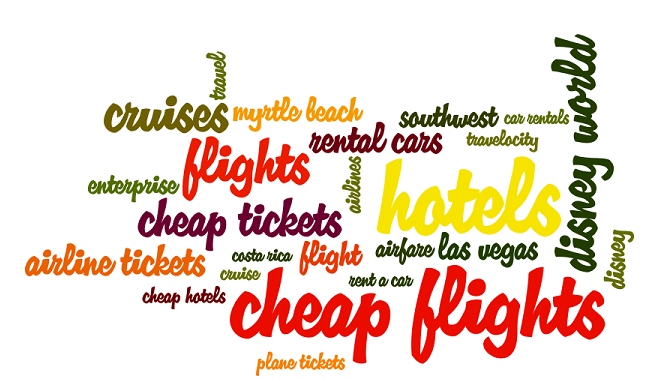
The 25 most popular travel keywords are as follows:
- Is it safe to travel to Turkey? : With approximately more than 6600 searches per month, this keyword tops our chart.
- How to travel the world? : Who would not like to travel the world and witness amazing sites all around the world and experience hundreds of cultures, many weathers, religions and so on. It has around 5500 searches per month.
- Is it safe to travel to Paris? : Around 5400 searches per month.
- Can Americans travel to Cuba? : People search this due to safety concerns and the ties between USA and Cuba. It is searched more than 4000 times per month.
- How to travel cheap? : This should be the most popular, however, people get to know about the financials in other articles too. Money is important to everyone and people try their best to have a great trip while keeping the budget intact. More than 3500 searches per month
- Is it safe to travel to Greece?: With more than 1500 searches a month, this too has safety as its primary concern.
- Is it safe to travel to Mexico? : Approximately 1900 searches per month
- Is it safe to travel to Istanbul? : Around 1800 searches per month
- Is it safe to travel to Morocco?: More than 1500 searches per month
- Where to travel in December?: People obviously want to utilize their Christmas holidays by vacationing at good places. More than 1500 searches per month.
- Where to travel in November? : Around 1400 searches per month
- Why do people travel? : Around 1600 searches per month
- How to get paid to travel? : Around 1600 searches per month
- How to travel alone?: Around 1600 searches per month
- How to travel the world for free?: Around 1600 searches per month
- Is it safe to travel to Israel? : Around 1600 searches per month
- Where should I travel? : Around 1600 searches per month
- Can I travel to Cuba? : Around 1300 searches per month
- Is it safe to travel to Thailand?: Around 1300 searches per month
- Where to travel in August? : Around 1300 searches per month
- Where to travel in February? : Around 1300 searches per month
- Do you need a passport to travel to Puerto Rico?: Around 1000 searches per month
- How much does it cost to travel the world?: Around 1000 searches per month
- How to make money while traveling?: Around 1000 searches per month
- How to travel with a Cat? : Around 1000 searches per month.
More popular travel keywords will be added soon. Stay Tuned!
Read: 20 Most Populated Countries in the World
We publish well-researched and interesting contents on our blog to help travelers.

The 5 Most Expensive Hotels In Dubai For A Luxury Experience
Leave a reply cancel reply.
Your email address will not be published. Required fields are marked *

30 Most Populated Countries in the World 2024
30+ best places to visit in pakistan 2024, 50+ travel blogs that accept guest posts 2023, 15 best cities to visit in usa 2024, top 6 best places & tour attractions in sialkot.

10 Best Places to Visit in Timor-Leste 2024

10 Best Places to Visit in Mongolia 2024
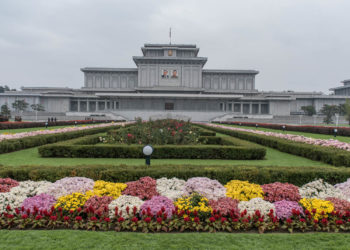
10 Best Places To Visit in North Korea 2024

Top 10 Best Places To Visit in Yemen 2024
Tripfore is a travel blog focused on best places, things to do and tour attractions around the world.

- Write For Us
- Privacy Policy
Tripfore.com Copyright 2019-2023. All Rights Reserved.
Top 50 SEO Keywords for Travel Agents
Ready to start ranking on search engines? Click on the button below to generate a free SEO report and insight into your top 3 competitors online.
The Top SEO Keywords for Travel Agents
There is no getting around it, any SEO campaign you run for your travel agent, no matter how brilliantly executed, stands or falls based on your target keywords. If your company has selected the right keywords, you will get more and more organic website traffic from Google as time goes on. Choose the wrong keywords, and your competition will surpass you. But there is plenty to be excited about! Did you know that there are over 74,000 U.S. based online searches for travel agents each month? By optimizing your website with the Top SEO keywords for travel agents you are providing yourself with inbound leads that will only serve to complement the ones you generate through referrals and traditional advertising methods. Here are the Top SEO Keywords for travel agents in the United States courtesy of the Google Keyword Planner .
Ready to Improve Your Search Visibility Online? Get Your Free SEO Report!
Each report is hand-crafted by a team member at MarketKeep and comes with a customized video that walks you through your report visually. That way we can help you understand how your business is performing online, and what you can do better in order to connect with your customers in the moments that matter to them.
- Name * First Last
- Company Website URL *
- Comments This field is for validation purposes and should be left unchanged.
The 50 Best SEO Keywords for travel agents (2023)
The 50 best seo keywords for travel agents (2022), ready to get started, learn about our small business seo services, & seo packages and how your site can rank higher., utilizing the top seo keywords for travel agents.
The key to ranking well when it comes to the top SEO keywords for travel agents it falls within 7 key components.
1. Making sure that your website is mobile-friendly, fast, and secure.
2. Incorporating your SEO keyword into top search results related to travel agents
3. Optimizing your website’s content, title tags, headings, and meta descriptions for your keyword.
4. Claiming and optimizing your Google My Business Profile completely.
5. Claiming and filling out your local directly listings with the same consistent NAP (Name, Address Phone Number).
6. Creating a key-phrase-optimized blog that contains high-quality content that is updated regularly.
7. Using photos and videos in your text that have been properly optimized with your SEO keywords for travel agents
The Three Steps You Need to Take to Rank Well
Ranking your website to be the #1 search result in your area involves a number of key components, and executing those strategies correctly each and every time. As small business owners, we understand that our websites need to be optimized and indexed correctly, but here are the three main factors to consider.
Local SEO – Your website needs to be optimized for local searches. Local SEO helps you to target customers searching within a specific geographic location. This is important because 33% of all clicks, go to the top 3 search results on the 1st page of Google. So if you have optimized your website for local SEO, you will automatically guarantee yourself a share of 33% of all online searches for keywords relating to your company. Here at MarketKeep, we will do the work necessary to boost your ranking online in 4 steps.
- Find high ranking search terms/queries your target audience is using
- Build high-quality content that will attract website visitors
- Optimize your Google Business Profile to take advantage of local searches
- Optimize your SEO strategy through your Google Analytics Account
On-Page SEO –
A big part of our SEO services for travel agents centers around on-page SEO. On-page SEO is the practice of optimizing each page of your website in order to rank higher in search results and earn more relevant traffic in search engines. That means optimizing each service you offer so that you can rank in the top search results not only for your company’s name but important searches related to the services you offer as well. We will also work on optimizing your meta tag titles and meta tag descriptions so that they successfully articulate what your agency does.
Off-Page SEO –
Have you ever noticed that when you search for your company in one location versus another you might rank differently? That is directly related to what is called, your Domain Rating. That is how strong of a website you have organically. Our off-page SEO services for travel agents focus on finding high-quality websites to help link back towards your website. This link building strategy helps to ensure that no matter where you are searching from geographically, your website can be found in the top places.
About MarketKeep
MarketKeep is a digital marketing agency for small businesses and start-ups based in Towson, Md. Our goal is to help small business owners plan, place, and optimize their digital marketing strategies. MarketKeep is proud to offer our clients the following services:
Website Design – As a website design company we build websites that represent you and your brand and instantly builds a connection with your customers online. To learn more about our website design capabilities please contact our website designers .
SEO Company – As a Maryland SEO Company , we partner with small businesses to help grow their organic presence online through on-page, off-page, and reputation management techniques. To learn more about our SEO services for small businesses please contact our SEO team .
Pay Per Click Experts – As your SEM Agency MarketKeep will plan, place, and optimize your SEM campaigns so that you are maximizing your SEM campaign. To learn more about our SEM Services please contact our SEM team .
Social Media Management – Tired of running your social media accounts on a daily basis? Not sure what to post? As your Social Media Marketing Assistants MarketKeep will plan, place, and optimize your social media strategies. To connect contact our Social Media Management Team today.
Local SEO – So many of us rely on our phones to find businesses and products that are close by. Don’t miss out on an opportunity to connect with customers in your backyard. As a Local SEO agency MarketKeep helps to position your business online to acquire Local SEO searches. Learn more by contacting our Local SEO Agency Team .

- Delhi Tour Packages
- Wildlife Tours
- Weekend Getaways
- North India Tours
- Honeymoon Packages
- Shimla Manali Tours
- Pilgrimage Tours India
- Punjab Chandigarh Tours
- Uttrakhand Tour Deals
- Private Day Tours
- Rajasthan Tours
- Overnight Tours
- Himachal Tours
- Golden Triangle Tour Packages
- Western India Things To Do
- Hill Stations
- India Temple Tours
- Renting a Car
- Adventure Activities India
- North India Things to Do
- Wildlife Sanctuaries
- Art & Culture
- India Honeymoon Destinations
- Family Vacation
- Immigration & Visa
- International Tourist Destination
- Eastern India Tours & Places
- Northeast India Tourism Activities
- South India Places & Activities
- India Road Trips
- India Tourism
- Trekking in India
- Travel Things To Know
- Travel News Worldwide
- India Travel Experience
- Read a Reviews
- Submit a Review
- Type of Tours
- Shimla Manali Offers
- Fixed Departures
- Tour Itineraries
- Agra Jaipur Offers
- Hotel Packages
- Vehicle Images
- India Images
- Photos Gallery
- Popular Places
- Forts & Palaces
- Golden Triangle Tour
- Rajasthan Tour Rates
- Shimla Manali Taxi Price
- Car & Bus Rental Rates
- Delhi Sightseeing Taxi Rates
- Long Term Car Rental Rates
- Rental Coaches
- Rental Cars
- Tempo Travellers
- Vehicle Packages
- Vehicles Booking
- Private Car & Driver
- Long Term Rentals
- Popular Tags
- Travel Stories
- Travel Blog
- Taxi Packages
- Best Sightseeing Places Tour
- Things To Do in India
- Promotional Tours
- Travel Guidelines
Top Travel Searches

Posted On : 2022-01-19
You Might Be Like These Suggested Tours
Popular travel searches, travel trending searches, top searched travel keywords, tour booking form.
Chardham Yatra Registration Figure Reached 10.66 Lakh, Maximum 3.52 Lakh Registrations For Kedarnath Dham
Mahakaleshwar Temple: Timings, Bhasm Aarti, History
Uttarakhand Trip Budget: Hotels, Adventure Activities, Days & Destinations
Jagannath Temple Puri: History, Location, Darshan Timings, How to Reach
Kamakhya Temple: History, Location, Darshan Timings, How to Reach
दिल्ली का चांदनी चौक क्यों है इतना प्रसिद्ध
मेघालय घूमना चाहते है कैसे करें यात्रा प्लान
चाहते है सिक्किम टूर प्लान करना यह है बेहतरीन तरीका
मंदिर के दान से चलती है राज्य की अर्थव्यवस्था (तिरुपति बालाजी मंदिर)
Triyuginarayan Temple: Location, History, Plan Your Wedding, How to Reach, Route Distance
Call Our Customer Care Executive. We Are Available 24x7 Just Dial.
Address : CB 206/5 Naraina, Ring Road, New Delhi 28 (India)
Office : 9810636126
Mobile : 9810833751
Email : [email protected]
Website : www.japjitravel.com
Usefull Links
- Hotels Booking
- Holiday Packages
- Cars / Buses on Rent
- Places To Visit
Other Resources
- Delhi To Punjab Taxi Service
- Tour Package Rates
- Photo Gallery
- Delhi To Outstation Services
- Tour By Theme
- Multi City Vehicles
- Add Your Itinerary
Popular Links
- Travel Bloggers
- Cars & Coach
- Account Details
- Our Used Vehicles
- India Car Rental
- List Your Hotel
- Agent Login
- Airport Taxi
- Car/Coach Rates
- Package Tours
- Delhi To Rajasthan
- Delhi To Himachal
- Delhi To Uttar Pradesh
- Delhi To Uttarakhand
- Monthly Vehicles
- Travel Jobs
- Delhi To Bihar Taxi
- Sanitized Car Rentals
- Delhi Airport Car Rental
- India Domestic Travel Guidelines |
- Tempo Traveller Comparison Between Luxury, Premium & Semi sleeper |
- General Terms & Conditions |
- Car Rental Rate |
- Used Cars & Buses For Sale |
- Japji Travels Bank Account Details |
- Careers At Japji Travel India |
- About Japji Travel |
- Car Rental Services India |
- Delhi Airport Taxi Service |
- About Indian Driver Chauffer |
- Packages Tours of India |
- Hotel Terms and Conditions |
- About Delhi Rental Car |
- Sanitized Car Rental Services |
- Delhi Airport Car Rental Service |
- Private Car and Driver Hire |
- Taxi Pictures |
- School Bus & Cab Hire Service |
- Types of Visa in India |
© All Copyright 2013 - 2024 Reserved japjitravel.com
- Terms & Conditions
- Join Bloggers
- XML Sitemap
- Hotel Login
Get In Touch On Whatsapp
Mobile : 09810833751

IMAGES
COMMENTS
Use keyword research tools. There are various keyword research tools available that can help you identify relevant and popular keywords for your travel niche. These tools provide insights into search volume, competition, and related keywords, allowing you to make informed decisions about which keywords to target. 2. Analyze your competition.
These are the most popular suggestions for Travel Keywords generated by WordStream's Free Keyword Tool. To get all of these keywords sent to you, simply enter your email address and click "Email Keywords" below. KEYWORDS (1-25 OF 100) SEARCH VOLUME. 1. hotels.
540. $6.05. 3. who makes best travel trailer. 210. $0.90. Mondovo's Keyword Research Tool has been designed not only to let users find keywords but to deliver key insights for each keyword so that users, like you, will be able to make sense of what you get and get things done with them.
Simply enter the keyword or phrase you're after, and it will bring up all the most popular pages for that term. It's also not limited to keywords specific to Google, but sites like Amazon and YouTube, too. As such, you can expect to find a variety of topics and long-tail travel keyword lists using this free tool. 6.
How to select the MOST SEARCHED travel keywords on Google; By the end of this guide, you'll have a database of travel agency keywords to use in your SEO strategy that looks like this: To put this guide in perspective and aid learning, I will act as an imaginary Texas-based travel agency and find the best SEO keywords for travel and tourism ...
Embark on a journey through the digital realm of travel, where the right keyword can unlock untold adventures. Dive into a curated list of search terms that seasoned travelers and new wanderers alike are using to craft their dream trips. From hidden getaways to bustling metropolises, let these essential keywords be your passport to a world of unmatched travel experiences.
This guide shares some travel keywords that you should consider targeting and will hopefully provide a starting point and inspiration for future keywords. Due to consistent algorithm updates, the relatively recent Helpful Content Update in late 2022, we've updated the written content that already existed on the page. We've written new content.
Here are the top 50 Travel keywords and the 50 best long-tail keywords. Use these top adwords keywords to optimize your campaign or website. ... The Most Searched Travel Keywords (1-50 of 500) Rank Travel Keywords Global Search volume Cost Per Click(CPC) PD(Paid Difficulty) 1: travel: 4118300: 1.07: 7: 2: Backpackers: 2066700: 1.26: 100: 3 ...
Search Popular Keywords in Your Industry. These are the most popular suggestions for Best Travel Keywords generated by WordStream's Free Keyword Tool. To get have all of these keywords sent to you, simply enter your Email address and click "Email Keywords" below. KEYWORDS (1-25 OF 100) SEARCH VOLUME. 1. cheap flights.
An example of a keyword for travel blogs could be "best travel destinations" or "travel tips and tricks." These travel SEO phrases are commonly searched by individuals looking for travel inspiration and advice, making them effective in driving organic traffic to your travel blog.
Examples of informational keywords include "best beaches in the world," " top travel destinations in Europe," and "how to plan a budget-friendly trip .". Transactional keywords, on the other hand, are those that people use to purchase travel-related products or services. Examples of transactional keywords include " cheap flights ...
Finding Keywords and Topics Using Ahrefs. Ahrefs has a number of fantastic ways of finding good target keywords for travel that you can then incorporate into your site structure and content. The Keywords Explorer Tool. This allows you to put in 'seed' words and surfaces all the top searched travel keywords that include those words. My ...
1,600. $0. Mondovo's Keyword Research Tool has been designed not only to let users find keywords but to deliver key insights for each keyword so that users, like you, will be able to make sense of what you get and get things done with them. If you liked this data on Travel Keywords, then you might be interested in The Most Asked Questions on ...
For example, search volumes on travel insurance and travel restrictions are likely to currently be higher than they have ever been because of the COVID-19 pandemic. High-Volume Travel Keywords. Here is a list of high-volume keywords related to travel in general. This is what people are searching for right now on the topic of travel and tourism.
Top air travel industry keywords. The first thing to notice is the ratio between organic and paid searches. The share of paid search is significantly lower than in the hotel industry. Strikingly, the traffic generated by the most searched keyword, 'American airlines,' is 99.99% organic.
Top 100 Most Frequently Searched Long-Tail Travel Keywords in the UK and USA . To make it easier for you to start using LT queries, we have provided a list of most frequently searched travel keywords in the UK and USA. Based on these terms, you can generate your own keywords and further develop your blog. Flights. low cost flights from london ...
In my experience: you should target long-tail keywords and start bringing in traffic. Then, once you have some authority, you can start targeting the short-tail keywords. There are 1000 keywords for travel and tourism - you just need to find the best ones to target. The key ingredient is to find long-tail keywords with a high search volume.
Access Google Keyword Planner by clicking on Go to Keyword Planner. Follow the prompts to set up a Google AdWords account. Don't worry, you won't have to run an advertising campaign to use the keyword tool. Select the box with Discover new keywords. Copy and paste your keywords separately into the search bar and click Get results.
Tracking and monitoring "Vacations Travel" related keywords is easy and on this page, we bring to you an exhaustive list of top Vacations Travel keywords. We have leveraged the power of Mondovo's Free Keyword Tool to get you this complete vacations travel keywords list. A List Of Most Searched Vacations Travel Keywords
There are three considerations to make when selecting travel-related keywords for use in online copy: 1. Search Volume. Search Volume is the total number of times a keyword is entered into a search engine in a given month. The greater the volume of monthly searches for a particular keyword, the greater the potential for generating website ...
Travel keywords include those web searches that people carry out the most related to travelling. Vacationing abroad is very common these days and people require travel guides that include the best transport facilities, hotel services, restaurant services, shopping centers, tourist attractions, historical places and so on about which the tourists would not know on their own unless they reach ...
The key to ranking well when it comes to the top SEO keywords for travel agents it falls within 7 key components. 1. Making sure that your website is mobile-friendly, fast, and secure. 2. Incorporating your SEO keyword into top search results related to travel agents. 3.
Top Searched Travel Keywords. To accomplish proper growth in business, one needs to understand how optimizing the proper keywords can help the business to reach the desired target group. It is always wise to use keywords that have low competition but high search volumes. This is why identifying the high intent keywords is important.